
Court Adjourned
Judge Ron Lowe reflects on 30-year legacy at the 35th District Court








Replacing windows and doors for more than 25 years! QUALITY PRODUCTS…KNOWLEDGEABLE STAFF! 22264 Novi Rd. Novi, MI | 248.308.3745 | novihomedesigncenter.com NO SUBCONTRACTORS, EVER! Your windows and doors are expertly replaced by our own crews. Make an appointment with CJ, Amy, Steve, or Ray. They all have decades of experience in the industry and will help you find a solution that fits the style of your home and your budget! Our showroom features Andersen and Marvin windows, Therma-Tru entry doors and other great home improvement products. The installation crews were true professionals, cordial, skilled and most importantly did a thorough clean-up every day. I will be bragging to my friends and family about the great customer service.”
Lori, Plymouth
windows and doors that fit tight, look right—and are sure to delight!
—
Replacement





Chris Soutar
Scott Daugherty
Chris has lived in the Plymouth / Canton community since 1994. Some his local favorites are: Campari’s on the Park, Basement Burger, Mexican Fiesta II, Pizza Vino, Spoons Place, Central City Dance Center.
Chris has lived in the Plymouth / Canton community since 1994. Some of his local favorites are: Campari’s on the Park, Basement Burger, Mexican Fiesta II, Pizza Vino, Spoons Place, Central City Dance Center.
csoutrar@billbrownford.com Office:(734) 524-2715
Mobile: (734) 765-8980

Scott has lived in the Plymouth / Canton Community since 2002. Some his local favorites are: Crow’s Nest (Canton), Golf at Pheasant Run Golf Course (Canton), Spoons Place, Palermo Pizza, DCFC Soccer.
Scott has lived in the Plymouth / Canton Community since 2002. Some of his local favorites are: Crow’s Nest (Canton), Golf at Pheasant Run Golf Course (Canton), Spoons Place, Palermo Pizza, DCFC Soccer.
sdaugherty@billbrownford.com Office:(734) 524-2773
Mobile: (555) 555-1212

(734) 421-7000 • billbrownford.com • 32222 Plymouth Rd., Livonia, MI
Meet the Local Sales Reps in Your Community. Explorer Leases Starting Below $400/month* Escape Leases Starting Below $300/month* *All prices include a/z plan with all factory/conquest/renewal/loyalty rebates to dealer. No plan, renewal or loyalty slightly more. plus tax, plates, title and doc fee. Residency restrictions apply. Call dealer for details.
Local Journalism Matters
Please consider a donation to support The Rock. Since we began publishing more than three years ago, our goal has been to provide our readers with valuable information about the Plymouth community each and every month.
Your support is vital if you would like to see us survive and grow. The Rock is sent free to every address in Plymouth, yet is not free to produce.
LOCAL Matters! That is the foundation of this magazine. If you find it of value, please consider supporting it. We need your support. Please send donations to: Journeyman Publishing, 16435 Franklin, Northville, MI 48168

Here is the list of readers who supported local journalism this month:
- Albert Bar
Advertise in The Rock
• Reach 21,000 addresses every month.
• We direct mail to every address in the 48170 zip code.
• Our locally-owned and produced publication is an affordable way for your business to reach the entire Plymouth market.
To secure space in an upcoming issue of The Rock, contact Advertising Director Scott Buie at (313) 399-5231, or via email at scottbuie@therockmagazine.com or advertising@therockmagazine.com.


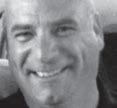









KURT KUBAN – Publisher
Kurt is an award-winning journalist, having served as a reporter and editor for several local newspapers and magazines, including the Plymouth Observer He has been a journalist for over two decades. He founded Journeyman Publishing, which also publishes The ‘Ville, in 2017.
SCOTT SPIELMAN – Editor
Scott graduated from the University of Oregon with a degree in Journalism. He covered western Wayne County for more than 12 years at several publications before transitioning into corporate communications and media relations. A Canton resident, he has also finished his first novel and is hard at work on his next.
SCOTT BUIE – Advertising Director/Vice President of Sales
Scott has 20+ years creating advertising campaigns for clients in Metro Detroit. After managing sales for radio stations for 17 years he purchased Street Marketing, where he works closely with a variety of businesses and events. Scott and his family have lived in the Plymouth/Northville area for over 23 years.
JENNY PEARSALL – Creative Director
Jenny has been in the design and print industry for over twenty years, holding various positions in graphic design, print buying, production and print management. She also owns Bovia Design Group, a company specializing in publications and corporate branding.
BRAD KADRICH – Writer
Brad is an award-winning journalist who spent more than 20 years covering the Plymouth community for the Plymouth Observer. He also spent 15 years serving his country in the U.S. Air Force.
BRAD EMONS – Writer
Over the course of his four decades with the Observer & Eccentric, Brad established himself as one of the preeminent prep sports reporters in the state, winning many journalism awards along the way. His greatest joy is interviewing local athletes and coaches, and reporting on their efforts.
SUE VOYLES – Writer
Growing up, Sue always knew she wanted to be a writer. She has written for many publications over her long career in public relations and journalism, and taught English and journalism at Schoolcraft College. In 2022, she received the national Headliner Award from the Association for Women in Communications.
TIM SMITH – Writer
Tim brings a penchant for telling personal stories that run the gamut from news to sports. During more than 35 years in journalism, mostly with the Observer & Eccentric, he has earned numerous state and national awards. The Wayne State grad is a published author and rec ice hockey player.
KEN VOYLES – Writer/Photographer
Ken is an award-winning writer, photographer and designer whose career has spanned nearly five decades in and around metro Detroit. He started his journalism career in Plymouth, working for the Community Crier. He is the author of two books on Detroit history, loves to travel and has finished his first novel.
BRYAN MITCHELL – Photographer
Bryan started working as a photographer more than 30 years ago, and was a staff photographer for the Plymouth Observer in the 90s. He has freelanced for The Detroit News, The Guardian, Reuters, and other publications. His photography has appeared in newspapers and magazines around the globe.
BILL BRESLER – Photographer
Bill arrived in Plymouth in 1977 to work for the Community Crier. He also worked for the Plymouth Observer for many years. Bill, who taught photography at Madonna University, retired from what was left of the newspaper business in 2019 and now freelances. He’s happy to be back in the Plymouth community.
The Rock is a product of Journeyman Publishing, which assumes no liability or responsibility for any inaccurate, delayed or incomplete information. Any form of reproduction of any content in this publication without the written permission of the publisher is strictly prohibited. Comments are welcome at kurtkuban@therockmagazine.com
•
• kurtkuban@therockmagazine.com MAR 2024 | VOL 5 | ISSUE 3
16435 Franklin, Northville, MI
48168
734-716-0783
RIP, Larry, the Best of All Neighbors
One night about eight or nine years ago, my dog Jack and I expanded one of our usual walking routes and took a different north/south street. It was a gorgeous night in the middle of summer and I was in the mood to wander—and Jack, The Best Of All Dogs, was always willing to go further and check out new places.
We came along a guy leaning against the railing on his upper deck with a cat sitting next to him. He was listening to either Metallica or the Scorpions; I forget which, but I think it was the Scorpions.
"Hey!" I called up to him. "You're just sitting on your deck with your cat, listening to the Scorpions? That's awesome."
"He's not my cat," he replied. "He just comes to visit."
That stuck with me through the years. Jack and I (and later George Michael and even later, George and Annabelle the Adventure Dog) frequently walked by. Every time Larry had a treat or two for the dogs. Annie liked him so much, she altered our regular route and wouldn’t walk any other way. (Annie is a rescue, a border collie/American goofball mix, and it’s sometimes easier to just let her choose her way than it is to drag her along mine).
Larry and I talked about lots of things as he handed out his treats: cards, football—the poor guy was a Bears fan, but I am a Lions fan, so there was a lot of commiserating— the neighborhood, life in general.
However many years later, Larry and Funny Face (he called the cat Funny Face), now 15 years old, were still together and it was clear that one of them had adopted the other— although it's anyone's guess who adopted who.
A few days went by and I hadn’t seen him out. A recent night was no different. As I tried to get the dogs to move along without their treat, I heard a little knock on his window. After a few seconds, Marie, his partner of 30+ years, came out, treat jar in her hands.
"That's really not necessary," I told her, thinking Larry was just out for the night.
"I don't know how to tell you this," she said, "but Larry passed this weekend."
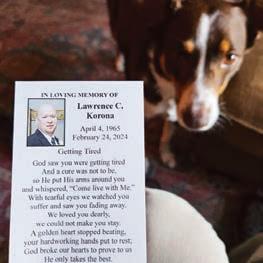
"Oh no!" I shouted before I could stop myself.
Friends and neighbors...I am still heartbroken. Larry embodied the best of the human spirit. You hear people describe others as "so nice" or "a great guy" or things like that. Larry was truly all of that. He was kind down to his bones and never had anything negative to say about anyone or anything (even, believe it or not, the Chicago Bears).
RIP, Larry, the best of all neighbors. Our walks, our little corner of the world, will never be the same.
That's the lesson for this month, folks: You never know which small random act of kindness will leave a lasting impression on someone or improve their day, so practice them all.
P.S. I want to thank everyone for reading last month’s issue and sending in letters about the issues you care about. Having an active, engaged public is so important in a vibrant community. It shows up in little ways, like helping police nab a suspect in a potential case of voter intimidation (Page XX) and in big ways, like chiming in on long-term plans to keep our community active, thriving and changing (Page XX).
I appreciate you all and look forward to hearing what you have to say this month, too.

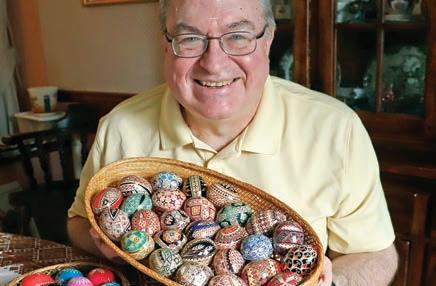

In this issue 14 THE EGGMAN KEEPS UKRAINIAN TRADITION ALIVE 12 WILCOX MILL NEXT ON LIST FOR RENOVATION WHERE’S GERRY THE TURKEY? 18 ON THE COVER: Judge Ron Lowe stands in his courtroom at 35th District Court, where he is now the longest serving judge in the court’s history. The Plymouth resident is not running for reelection. Photo by Ken Voyles Scott Spielman is the editor of The Rock. He welcomes your feedback at scottyspielman@gmail.com. A NOTE FROM THE EDITOR Your Voice: Letters to the Editor 4 Judge Lowe ready to step down from the bench 6 Track owners file lawsuit against Plymouth Township 10 Plymouth Study Group begins its 73rd year 20 Gallimore Elementary riding high with national, state honors 22 Scorekeeper Scott Thomas logs 2,000 games for Canton hoops 24 Plymouth Rotary’s 100 years of service featured in book, exhibit 26 Man accused of installing fake cameras at voting site apprehended 28

Why not vote on it?
I am all for the racetrack coming to Plymouth, to say the least. It would create many jobs and lots of revenue for our township. Why was this not put to a vote? And maybe we need a new set of trustees that could see the potential of something that could bring in a lot of money. I personally would rather have had the race track over the dump!
Linda Rudowski
Disappointing racetrack decision
I’m very disappointed in the township officials who very shortsightedly turned down the proposal for the racetrack. It would have added some income and personality to Plymouth. I believe that, unbeknownst to us, someone with personal monetary interest has their eye on the land. Being a 49-year resident of Plymouth, I am saddened by this poor decision and some large industrial business will work their way in and make that corridor another wasted area used only for unwanted boring personal gain. How close is the nearest junk yard?
Gerald Townes
No racetrack
I just read the article in The Rock and am responding to your invitation to express what I think.
I do not think having a racetrack in Plymouth or Plymouth Township is a wise decision. Just think what has happened to all other tracks in the southeastern area of Michigan—they all are gone.
It might be an exciting attraction for a while, but they soon come to an end. Sure, they might bring some revenue and taxes, but the cost of construction and infrastructure of the surrounding area then becomes expensive. I say no to having a racetrack in this area.
Marilyn Henry
Why not an amusement park?
I think killing the development of a racetrack in Plymouth Township is a good idea. Let's build something that will bring in revenue for the township equal to, or more than, the property owners.
I'm talking about an appropriately sized amusement park. Currently we have to travel to Ohio to visit an amusement park. The associated infrastructure around those places and the revenue it produces is impressive. If a concert venue were included with the amusement park, we would have year-round revenue.
Lots of possibilities with great opportunities for the community to develop economically and thrive.
Gary Odor
Find a better use for vacant land
As someone who has worked and lived in this area for more than 50 years, including a period of time working at the Ford Northville Valve Plant, I saw the city of Northville take little or no action to improve the Northville Downs racetrack area. If it was an asset, they would have worked to keep it.
Now, some people want Plymouth Township to accept an eyesore with hopes it would be an asset to us. Do we really think it is something we need or want? I think there is a better use for our vacant land, including saving some greenspace in a township that is rapidly losing so much vacant land to development.
Earl Baker
Keep Sparr’s green
As a 30-year resident of Plymouth Township, I’ve silently watched thousands of trees being torn down, hundreds of acres cleared, and wildlife habitat destroyed. I believe in progress, but the township planners seem determined to raise concrete slabs on every square inch of our beautiful township. Is it really progress to tear down three homes on a small patch of land on a quiet corner to build two 2.5 story buildings and, of course, another parking lot? The residents in this community are obviously opposed to the plan.
My recommendation is quite simple. Since this plot is a blank slate, why not buy the property from the owner? Plant a few trees, add a couple of benches, maybe a memorial of some kind, and allow the residents to enjoy a place of respite while reminding thousands of people driving by each day that Plymouth Township is a beautiful and most desirable community?
I understand that this plan would not increase the tax base and would need to be maintained, but the cost would be minimal. Looking at the very long list of new construction in the township, we can afford it.
Nancy Aquilina
We pay enough already
In response to your request for feedback to this water affordability proposal, my answer is:
Hell no! I pay enough for my water and sewerage already. I would love to be able to live in a lakefront home on Orchard Lake, but I can't afford it. The fact of life is you can't expect someone else to pay for your expenses forever. Please find someplace you can afford and live a healthy life in peace.
John Truskowski
4 | The Rock YOUR VOICE: LETTERS TO THE EDITOR Please submit your letters by emailing Editor Kurt Kuban at kurtkuban@therockmagazine.com. Letters must be no more than 150 words. We reserve the right to edit all letters. SOUND OFF
Say no to water “affordability”
I don't agree with charging the homeowners additional $2 on their water bill. I feel we pay enough for our water rates, which just increased. A lot of people are on fixed incomes.
Valerie Bartlett
It’s Detroit’s problem
I am just really mad that we should pay for Detroit’s water problems. For years I have seen their broken water issues. They can't even shut off the water to vacant property. And we pay. Their fire hydrants don't work, they let it go so long. Now let us pay again. Our water bills go up. Do something besides increase our bills. They got the NFL draft here and playoff games. Use some of that. Come on.
James Bartlett
Show some compassion!
Who wouldn't spend $2 every three months to help the poor?
Kurt Heise is obviously not a true public servant and should be removed from office. Come on Plymouth Township, show some compassion.
Valerie Byrd
Dreaming up the ideal retirement is your job.
is ours.
We’re excited to hear from you.

Thanks for the news (and laughs)
Thank you for dedicating a number of your pages to hard news from our community. I hope to see more of that. Many of us know the collapse of newspaper journalism’s business model does not bode well for reporting facts from which engaged citizens can make informed decisions. I’m looking at you, Scott Spielman.
And then there is the February, 2024 showcase story about the Sandra Sagear wall and the letters to the editor. This month’s story budget and opinions have convinced me the word “entertainment” should be added to your cover tagline.
I laughed out loud when I saw the “Profiles in Courage” cover. Was the Sagear Wall so visually underwhelming that “unique vision” devolved into branding the artist/architect of the wall instead?
In closing, thanks for funny stuff at a national tipping point. Thanks for the letters you shared from Plymouth outraged by your editorial disrespect for the ex-president. I smile at the lunacy of a dignified lady’s willingness to jump in bed with an adjudicated sexual abuser for four more years.
Eno Laget

> edwardjones.com | Member SIPC IRT-1848J-A AECSPAD 20947977
1176 South Main Street Ste A Plymouth, MI 48170 734-454-4653
Helping you get there
John A Birchler, CFP® Financial Advisor
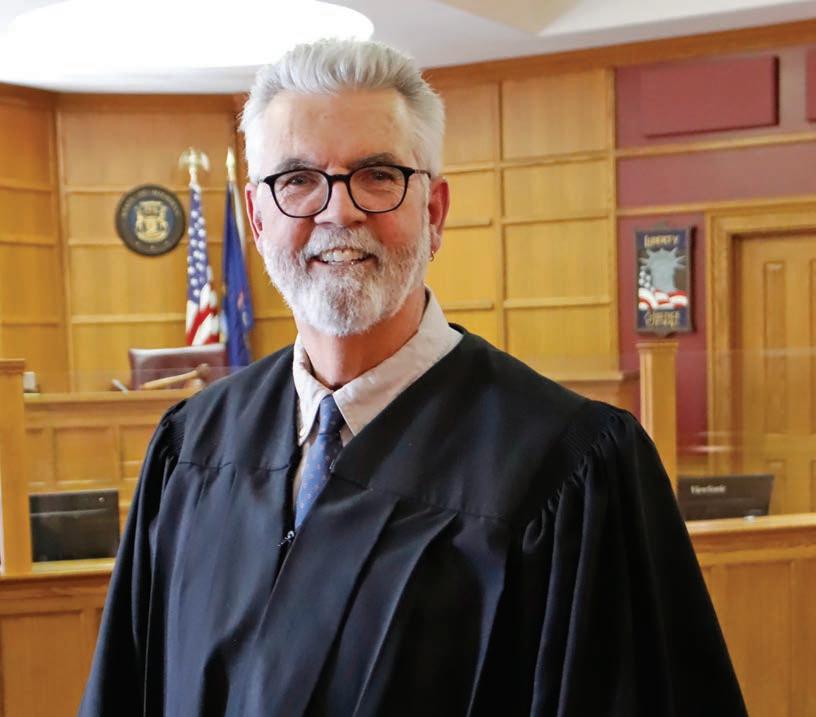
How do you measure the legacy of a man who has served his community for 30 years?
Perhaps it’s the stories he tells that reveal his devotion to being a local court judge. It could be his well-planned path and intense focus on wanting to sit on the bench as a young boy captivated
service, the Honorable Ronald Lowe knows it’s clearer than all that. Lowe has been intimately involved in the lives of thousands of individuals and families at their most vulnerable -- in a court room, where the human condition is on display at its most basic, often heart-wrenching level.
Being the 35th District Court’s longest sitting judge, Lowe has
by their actions, for good and bad. So now as he looks ahead to retirement he’s able to add up the human element more closely. He figures he’s had well over 120,000 deeply personal interactions, across at least 5,000 legal cases every year.
Because of what he does and who he is -- a man of deep faith and conviction -- Lowe applies
“I am most proud that I have mostly succeeded in what I promised when I was sworn in. That’s to be fair and friendly. I may not be the sharpest legal mind, but I’ve always made the best legal decision I could, knowing people are at the heart of it.”
by a local legal legend. Maybe it’s the multitude of cases he’s adjudicated, or the legal values he brings to work every day. Then there’s always tenure -- longevity stands for something, after all.
Today, as he reflects on his
just about seen it all, including changes in the law itself and numerous technological advances. He's seen one courthouse burn down and helped plan its replacement. Yet there’s been one constant: People are impacted
affects me. I tell kids that every week I have to forgive someone for behavior I personally don’t agree with and I have to punish people for behavior that I may not have an issue with. So I always ask, who is that person or family in front me?”
PLYMOUTH MENTORS
A Plymouth man through and through, Lowe came to the community in 1968 with his family, led by his father, attorney Charles Lowe, a man whom he deeply admires and equates with his other heroes, Abraham Lincoln and local judge Dunbar Davis. His father came to open a legal practice and, along with wife Bettye, raised three children. Two of his three children, Ron and Charles, would become lawyers and stay in the community.
Then local legal legend Dunbar Davis became the first judge of
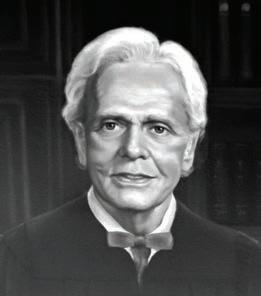
the 35th District Court in 1969. The court was later named in his honor, though though that was removed when the courthouse burnt down and had to be rebuilt. Today his portrait hangs above those of the current judges.
one rule to it all, the law. And sometimes, common sense.
“It’s not just about cases,” says the 67-year-old chief judge from Plymouth Township. “What we’re talking about is the people. What I do affects people’s lives and it
Lowe’s father took over Davis’ practice and later became the city attorney, a job his son would eventually take on as well. Thus Davis entered Lowe’s life. He was to become a mentor, a Sunday school teacher, a counselor and
6 | The Rock
even supporter when Lowe ran for his own seat on the bench.
The law was a huge topic at home, he says, and at Central Middle School, Lowe had his first trial (a mock student trial) coached by his father and presided over by Davis.
Lowe graduated from Salem High School in 1974, the first class of the new school in Canton. While there, he was the prosecutor in another mock trial, this one of Lee Harvey Oswald. He also entered a school work program where he became an aide to Davis at the courthouse.
“After the sessions he would require me to explain what I learned that day,” says Lowe. “Our paths intertwined from my earliest days here.
“You know legacy isn’t a big deal these days,” he adds, looking around his office packed with 30 years of reminders of his passions-- from black powder firearms and hunting to history, Lincoln, Hillsdale College and Plymouth. “It’s nice to think
After graduating from Hillsdale College, Lowe went to Cooley Law School where, after failing a class, he wondered if he should give up on the law. That’s when his father, who died 15 years ago, shared a maxim that has had a profound impact on him, and is still painted on the wall of Lowe’s court room.
“He told me to remember that sometimes good law is just good common sense,” says Lowe. “I have tried to live that out. I am most proud that I have mostly succeeded in what I promised when I was sworn in. That’s to be fair and friendly. I may not be the sharpest legal mind, but I’ve always made the best legal decision I could, knowing people are at the heart of it.”
As city attorney, Lowe also sought to get deeply involved in his community, joining the Jaycees and Rotary clubs, the local Republican group, and caring about his church, First United Methodist on North Territorial. He had married
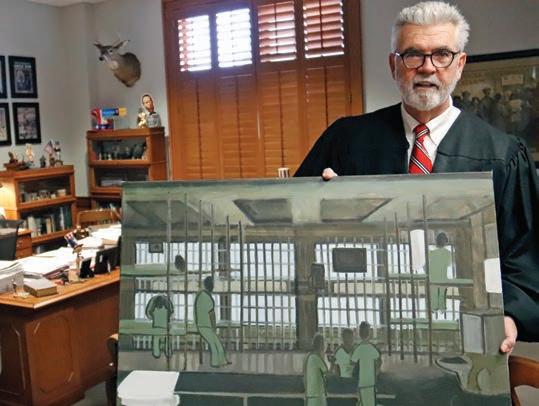
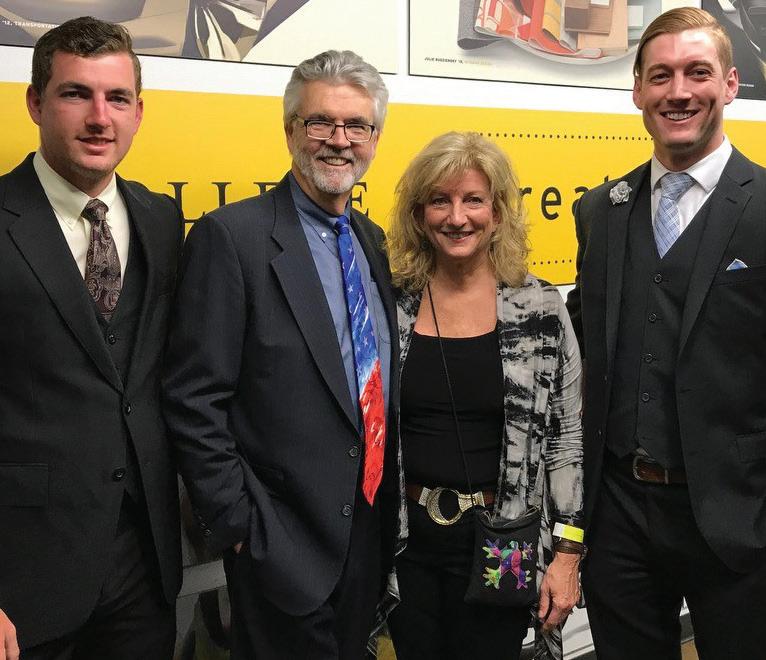
FUTURE ON THE BENCH
Lowe faced 11 opponents when he decided to seek election in 1994, but his ongoing efforts to create relationships within his various “circles” and an endorsement from Davis led to his victory. He was sworn in in 1995 and today is chief judge, serving as leader over the entire court, which serves five communities – the cities of Plymouth and Northville, and the townships of Canton, Northville and Plymouth.
“I had a dream and was sharp enough to make the right decisions,” he says. “I wanted to be on the bench. The law became my mistress and, as my wife (Jeanine) knows, for me it’s about God, the law and the family. Jeanine knows she can’t compete with the law, but she has been there for me all along.”

about for sure, but my mentor Dunbar Davis once had his name on this building. That’s gone and most people don’t know who he was.”
Jeanine in 1987 with a Plymouth mayor presiding and was soon living in Canton raising two sons, Ron and Rob, while eying his legal future.
Over the years Lowe’s legacy in the court includes starting Teen Court, Law Day celebrations, new community outreach and juvenile court procedures, the expansion of work detail programs, designing the new courthouse (after the fire), a drug/sobriety program, new efforts to showcase the
court’s history, and developing various citizen feedback boards.
He’s also seen change, from the days when search warrants required a visit to his home at night to electronic warrants, from the use of fax machines to Zoom legal proceedings. Though change is inevitable, Lowe worries about today’s more impersonal proceedings where human contact is often lost and “learning by spectating” is more unlikely.
He reflects on many things about the court he leads, and often more, trying to zero in on the memorable moments, for better or worse.
“You learn to deal with the stress that’s often behind what you do,” he says. “People put judges on a pedestal and some judges see being a judge as who they are. For me it’s been a lifelong passion but it’s also just a job. It impacts a lot of people for sure, but I am no different than anyone else who loves what they do.”
Think about it for a moment –a judge’s decisions impact what happens to a person or family.
Continued on page 8
The Rock | 7
Continued from page 7
Lowe knows all of it, feels it deeply and has learned to deal with it like everyone else.
“You learn how to handle it,” he says. “You gain confidence in your decisions, in your understanding and your experiences with the law. My faith helps me and my family.”
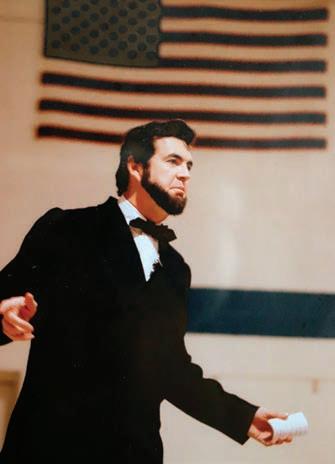

in their heart are storytellers and what they make of the stories they hear -- from the defendant and the prosecutor, and later on the public’s perception of those stories.
And yet outside the courtroom, Lowe is an adept storyteller who can be mesmerizing when dressed as President Lincoln, General Grant or Teddy Roosevelt, sharing with students the tales of these and other American legends.
That side of Lowe began more than 25 years ago when he shaved his mustache, dyed his beard and hair black and took on the persona of Lincoln for a class of students in Garden City. While his storytelling days are more limited these days, he has been able to channel his love of history and passion for learning into sharing with thousands of school children.
Last July, Lowe fought the toughest battle of all – for his life. He was on vacation when he ended up in a Traverse City hospital with a severe lung infection that could have easily killed him. Facing death, Lowe put his life in God’s hands but wondered if it was his time.
“It became clear that it was time to look forward to the dreams and promises my wife and I made about doing the things we still wanted to do together,” says Lowe. “I decided it was time and announce I wasn’t seeking another term.”
As a non-partisan judge, Lowe’s six-year term will be up at the end of the year. He will go on from there and leave future decisions about the court’s
from his life as judge, including a painting he once received from a defendant after he served his jail time.
“As a judge you don’t always get much feedback from your interactions in the courtroom, but sometimes I get letters from people and I keep them on my desk. I read them sometimes when I’m feeling low.”
He shows a painting of a bleak jail scene sent to him not long ago. He smiles and explains that the painting reminds him of the people he has interacted with.
“The man sent it to me after he got out of jail where he worked hard to change his life,” says Lowe. “I keep it with me and look at it often.”
There are so many stories, and many people who tell good stories. Lowe is one of those, even if it’s not necessarily his job. Yet in the end it’s easy to see a new story being told – that
So many questions arise. What was his worst case is a good example. For Lowe what stands out were two probable cause hearings. One involved a mother who hung her child, the other a man who killed his wife, dismembered the body and left parts across several states.
“When it comes to trials they are about the facts of the case,” he says. “A judge presides over the evidence, but the law applies. You provide the forum, but sometimes cases don’t go to trial and people wonder if they had their day in court at all.”
A STORYTELLER
Listening to Lowe, one wonders if what judges really are
“When I was on the bench in the early days I had some free time the way the scheduled worked and I used it to study people like Lincoln,” says Lowe. “I love history and I wanted to share it.”
Lowe’s beard always played a major part in his Lincoln persona. Students would grab at it to see if it was real. His wife hated the “Ahab look” and yet Lowe had a gift of storytelling, educating thousands about one of this country’s greatest presidents.
“It combines a lot of my passions for history and learning,” says Lowe, who likes to tell people he believes education can only lead to understanding which then leads to an appreciation, either for history or the law. “You can’t appreciate what you don’t understand.”
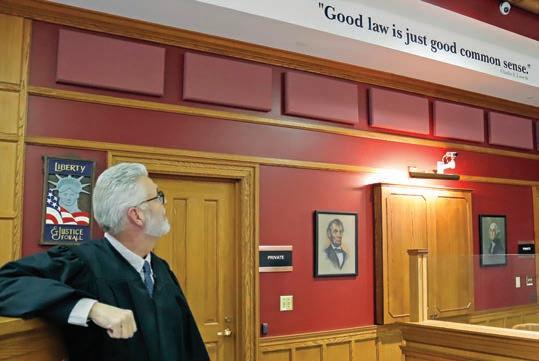
makeup to others. His plans include family, and the passions he has for reading, studying, learning and more. Maybe he’ll build a fourth or fifth long rifle, do some hunting or relax up north or at his Plymouth home.
But he’ll remember the many people and the small tokens
of the life of a judge who served for 30 years, facing hundreds of thousands of faces and deciding their fate one way or another.
As Charles Dickens once reminded us, a good life is measured by the people we meet, interact with and care about, even if in just some small way.
8 | The Rock



Elevate your business with our tailored commercial lending solutions. At Huron Valley State Bank we understand the unique financial needs of businesses in the community. Whether you’re looking to expand operations, invest in new equipment, or seize growth opportunities, we are here to provide financing to make it happen. Customer Focused, Community Based hvsb.com 706 S. Main Street, Suite B • 248.387.6083 Plymouth Loan Center Smart Loans For Business Success Darren R. LaLondeIngrid Runnion

Track owners sue Plymouth Township
The ongoing saga of the proposed relocation of Northville Downs to a 125-acre parcel of land in Plymouth Township has reached a new chapter.
Owners of the racetrack filed a federal lawsuit against the township last month after township officials decided to stop negotiations on the project and did not extend a Planned Unit Development agreement under which they were working for more than a year.
Mike Cox, attorney for the Carlo family, which owns Northville Downs, alleges in the lawsuit that the township placed unconstitutional conditions on the approval of the PUD agreement through a Community Benefits Agreement that stipulated the developers share revenue and development amenities for the community. They’re seeking $10 million in damages. They also want a federal judge to reverse the denial of the project and allow them to proceed with it.
“I'm very disappointed,” said Plymouth Township Supervisor Kurt Heise. “We’ve reviewed the complaint and it’s more of a political document than a legal one. It outlines a
series of events which we certainly dispute occurred and we’re more than prepared to back that up,” said Plymouth Township Supervisor Kurt Heise. “We’re going to move quickly to have the case dismissed and we’re very confident that the federal court will appreciate our arguments.”
Among the disputed facts, Heise said, are what the township was seeking through the CBA and the way township officials were negotiating with the developers. He also took issue with Cox’s claim that Plymouth Township aggressively pursued the development, once the decision was made to pull out of the City of Northville, where the racetrack had operated since 1944.
“It’s not true,” he said. “They wanted to be close to their fan base, and that makes sense. We responded to their inquiries as we would with any business that’s looking to locate here. Whether they considered those promises or incentives, that’s their interpretation.
“Whenever a business is interested in coming to Plymouth Township, we tell them what the zoning issues are—whether they’re properly zoned,
whether they’ll need a special land use, whether they’ll need a PUD, which was the case here—and then people always ask: what are my chances?
“It’s part of the governmental process,” he added. “You do need to give the applicant an idea of what the likelihood of success or failure is going to be at the planning commission, at the board of trustees, at the zoning board and that happens in virtually any economic development transaction— especially one where everybody knows it’s going to be controversial.”
He also said the Carlos were looking at other sites in Northville Township, Webberville, Fowlerville, Howell and other areas— even while they were negotiating with Plymouth Township.
Cox, however, said the Plymouth location was where the Carlos wanted to be.
“We have to look at other temporary spots in order to try to keep the business alive and our employees employed,” he said via email. “We have invested millions at the site already, so it is our longterm plan to stay there as a permanent site.”
Some aspects of the CBA were also in dispute.
the residents of Plymouth township. We recognized that this was going to be a controversial project from day one,” Heise added. “I believed we tried to get the best deal possible for our residents to provide funding for recreation and public safety and ND simply could not deliver.”
Cox alleges that the township asked for $5 million in revenue sharing through breakage fees, above and beyond the community features that included a large horse barn that could house township events, pickleball courts, soccer fields, a walking path that would be open to the public. It would also have hosted events like drone shows, Fourth of July celebrations and a farmer’s market.
“The out-of-pocket costs of all these other demands that were not straight cash—building and maintaining soccer fields, pickleball courts, walkway, etc—these demands increased that $5 million even more,” he said.
Heise said, however, that the township had only requested $3 million in revenue sharing over 10 years: $500,000 in each of the first two years of operation, followed by a guaranteed $250,000 each year after that.
“It was comparable to the revenue shares that they were giving Northville. We just wanted to get that in writing and guarantee that we could get a minimum amount of the revenue of sharing. They couldn’t agree to that,” Heise said.
“We drove a hard bargain. We looked out for
Heise said that both sides agreed, in principle, with the concept of the CBA throughout the process, even as negotiations faltered over the summer and ultimately broke down earlier this year. The final straw, he said, was when Cox communicated directly with the township board of trustees—and the media— rather than going through the township attorney. He characterized that as a bad faith negotiation tactic and said it led to the township pulling the plug.
“Plymouth township, in my opinion, we did everything right,” he said. “I think we provided them ample due process. I think we negotiated in good faith throughout this process in a very transparent manner. We operated under the direction of the township board.
“If John Carlo wants to blame anyone for this misfortune, I would aim it at the state of Michigan. I believe the state of Michigan has been hostile to the horse racing industry for decades. I think it’s been directed by the Detroit casinos and unfortunately I think they’ve succeeded in putting these guys out of business.”
10 | The Rock




We are excited to offer the next level of natural healing, from spinal decompression to laser therapy to nutritional advice. We can offer you choices to getting better, naturally

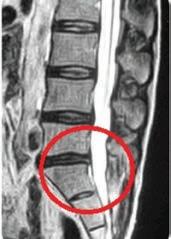
A
chiropractic visit can help heal your body naturally and could help you avoid taking medications or having surgery.
851 South Main Street, Suite #3, Plymouth, MI • mashikechiropractic.com • 734-354-0020 236,000 S P I N A L A D J U S T M E N T S A N D C O U N T I N G ! P R O V I D I N G P LY M O U T H C H I R O P R A C T I C C A R E F O R O V E R 2 0 Y E A R S ! Dr. Adam Mashike Chiropractor, Functional Medicine Practitioner MRI scan before & after SPINAL DECOMPRESSION BEFORE AFTER Call 734-354-0020 to schedule an appointment today! Feeling better starts here. Online or in-person. Livonia Novi glpg.net (586) 991-3905 17940 Farmington Rd. Ste. 302 Livonia, MI 48152 41700 Gardenbrook Rd. Garden Office B Ste. 110 Novi, MI 48375 Interested in a career with GLPG? We're hiring therapists! Visit careers.glpg.net to learn more.

community leaders. “Local units of government understand how cost prohibitive it is to do these projects.”
MULTI-PHASED PROJECT
The 4-acre Wilcox Mill was the site of the 1850 Hardenburg Gristmill before Henry Ford purchased the property in 1920. It was too dilapidated to restore, so Ford tore it down and built the current mill in 1923. The factory initially produced generator cutouts and later taps, a tool used for forming internal screw threads. At one time, 95% of Ford Motor Company's tap production took place at the Wilcox Mill. During WWII, when plants were converted for war production, the 60 employees of the Wilcox Mill’s built engine parts for the B24 “Liberator” bomber.
In the two years since the opening of Phoenix Mill Events — an event space housed in the restored Henry Ford village industry factory bearing the same name — Critical Mass, LLC co-principals Greg Donofrio and Rick Cox aren’t exactly resting on their laurels.
Having added both the Wilcox and Newburgh mills to their portfolio of Henry Ford-built, Albert Kahn-designed village industry factories, Cox and Donofrio are about to undertake restoration of the historic Wilcox Mill in Plymouth.
The two engineer entrepreneurs now own three of the four village industry plants along the Middle Rouge River.
Wayne County retains ownership of Nankin Mills in Westland, which is now an interpretive center and headquarters for the Wayne County Parks Division. Cox and his wife Diane own the 72,000-square-foot former Northville Valve Plant, now the Water Wheel Centre in Northville. The structure was

also one of the 19 Henry Ford village industry factories.
“We’re hoping to have the project before the City of Plymouth Planning Commission in April,” Donofrio said of the Wilcox factory. Though plans for the building use are still percolating, Donofrio said they have secured an operator for a coffee house to be located on the structure’s upper level. He’s mum on the operator’s identity at this time but noted that they are looking to have a 45 to 60-person seating capacity in the space.
“We haven’t found the right tenant for the lower-level area, but we’ll know when we have the right fit,” he added. Such was the case with the Phoenix Mill. Original plans called for a restaurant on the upper level. That plan fell through at the same time renowned architectural firm Grissim Metz Andriese was looking for new office space. It proved a perfect fit. The firm moved into its new Phoenix Mill headquarters in October 2021.
Donofrio said he and Cox
approach projects through the lens of “preservation first and must have a use that benefits the community.” He admits that they also are drawn to structures that are historic, automotive related,
When the tap operations were moved to the Waterford plant (another village industry factory, located on Northville Road), the company deeded the property in 1948 to Wayne County. Since that time, it has been used as a maintenance facility, a storage area, and a workstation for the
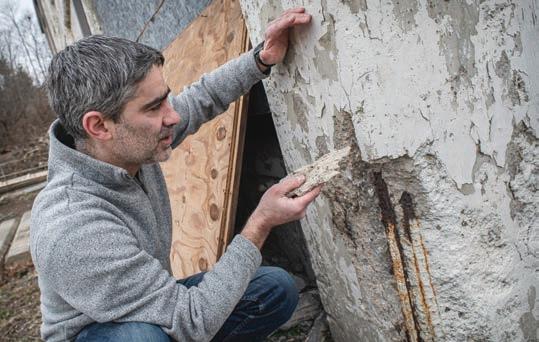
and connected to Henry Ford, which explains the appeal of the Ford’s village industry plants.
“Rick and I want to preserve these structures, not demolish them,” Donofrio said, adding that he is grateful for the support they have received from
county’s alternative work force.
Though the Wilcox Mill is about half the size of the 10,000 square foot Phoenix Mill, it is not without its challenges — as is any historic property. Among Donofrio’s first priorities is “sealing up the structure and windows.”
12 | The Rock
Donofrio and Cox have extensive experience in window sealing and replacement, having replaced 1,300 glass panes at the Phoenix Mill and 9,000 at the Water Wheel Centre. Donofrio estimates that the Wilcox restoration will take about 18 months.
With the Wilcox Mill project under way, Donofrio said
the Wayne County Sherriff’s mounted division. “We’re involved in helping them find a better home,” Donofrio noted. Once that has been determined, restoration of the mill will follow.
“By the end of the year, our goal is to have more details on a multi-step project,” he said.
Henry Ford purchased the

greater attention will be given to repurposing the Newburgh Mill. He noted it is a multi-phase project with the first focused on finding a suitable site for
former Newburgh Cider Mill in 1933 and razed it in 1935 to construct a new village industry factory on the site. Local farmers and Rouge Plant workers were

employed to build the new factory, which specialized in the production of twist drills and drill bits. Ford Motor Company sold the Newburgh Mill facility to the Wayne County Road Commission in 1948. It was used for decades by the Road Commission's Forest Division and later became home to the Wayne County Sheriff's mounted division.
PHOENIX RISING
Since its opening in early 2022 — the mill’s 100th anniversary — Phoenix Mill Events (phoenixmillevents. com) has brought throngs to the restored historic Ford plant. Coowners Kristin Donofrio, Greg’s wife, and Shannon Moegling manage bookings and planning for a variety of events from weddings and social gatherings to corporate events. The space — both inside and out — allows the public to view an iconic slice of manufacturing history.
The grounds surrounding the building are a respite for Hines

Park cyclists and hikers who often come to just enjoy the view — one that was closed off to the public for decades. Plantings done during the past three years include river birches, maples and evergreens. This summer, the front of the building along Northville Road will be awash with more than 1,600 bluestems…quite the critical mass.

ESTATE PLANNING WILL & TRUST LITIGATION PROBATE & TRUST ADMINISTRATION 35TH DISTRICT COURT MATTERS 607 S. Main St., Ste. 101, Plymouth, MI 48170 (734) 414-0358 | BARONELAW.NET Joe Barone ATTORNEY AT LAW Serving our community for nearly three decades!
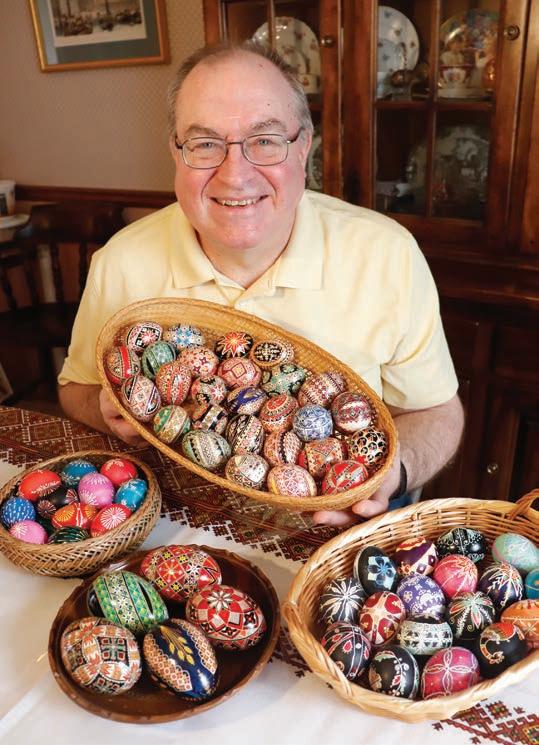
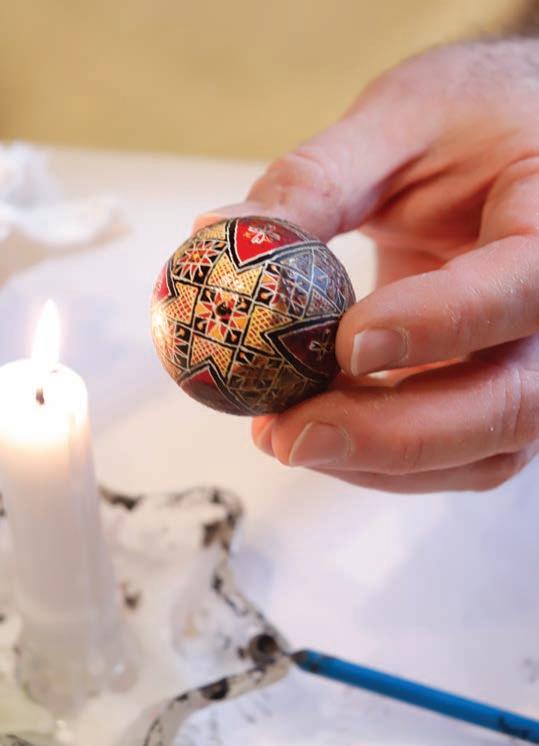
Keeping an ancient tradition alive
Plymouth man’s been hand-crafting Ukrainian Easter eggs for a half century
By Sue Voyles | Photos by Ken Voyles
It’s not unusual for families to have traditions. Some are based on culture, faith or ethnicity. Some are newer and some are old. For one Plymouth man, his family’s tradition goes back thousands of years in a region 5,000 miles away from metro Detroit.
Plymouth resident Andy Glovatsky learned the art and practice of creating Ukranian Easter eggs from his parents when he was a young boy.
Called “pysanky,” from the Ukrainian verb pysaty--which means to write--the art of decorating eggs dates back to pre-Christian times. Throughout history, many civilizations have regarded eggs as sacred,
symbolizing life, rebirth and for some, were part of pagan worship of the sun.
“The egg was always treated like something special in the old days and every culture has unique applications and respect for the egg,” says Glovatsky.
Decorated eggs can be found in a number of Eastern European countries. Today, the Ukrainian practice is tied to Orthodox Easter, celebrated May 5 this year.
“In the Eastern churches we prepare food baskets to get blessed on Easter. We make the eggs usually during Lent to be in our basket,” explains Glovatsky. “Usually you keep some and give some away to friends and others.
It’s considered a good omen or to bring you peace and prosperity. You give them to special people.”
Glovatsky’s connection to Ukraine goes back more than a century. His grandparents immigrated to the United States in the early 1900s from what was called the Austro-Hungarian Empire in Central Europe. They ended up in Nesquehoning, Pennsylvania, a coal mining region.
“They came here for a better life,” says Glovatsky, 58, who was born in Pennsylvania. His heritage is both Ukrainian and Polish. “My grandfathers were coal miners, and my grandmothers took care of the home and family. Both my
father’s and mother’s side were taught egg decorating as they grew up.”
Glovatsky’s father moved his family to the Finger Lakes region of New York where he grew up in the town of Waterloo. His parents Andrew and Mary, who met in Pennsylvania, didn’t waste much time teaching the youngster and his two brothers the art of egg decorating.
“I was six years old when I started learning this. Every Lent, my mom would put the supplies on the table and she would work on them. And my parents would tell the kids to make one,” he explains, adding that he felt he did not become “really good” until his late 20s.


14 | The Rock
An electronics engineer by trade, he accepted a position in the automotive industry in the 1990s and moved his family to metro Detroit, selecting Plymouth in 1998 as the place for him and his wife Linda, whose heritage is Armenian and Polish, to raise their three daughters.

“I was looking for a nice small town like upstate New York. I wanted something small, but close to the city where the kids could walk to school.” Describing himself as “tending to be artistic,” he kept the family
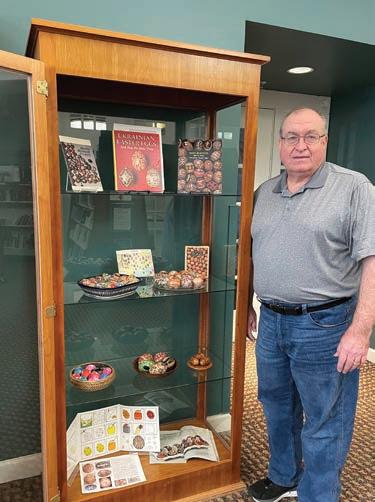
“I introduced pysanky to my kids when they were about 8 or 9. We usually do it every year,” says Glovatsky, A member of St. Michael Orthodox Church in Redford, which still celebrates the food basket tradition, he has also helped his faith community continue pysanky as an art, teaching a class there a number of years ago to about 20 children and their parents.
BEAUTY AND MEANING
Looking at a Ukrainian Easter egg, one can’t help but be impressed by the detail and beauty. While the decorating tools have been refined over the years, the primary method is a repetitive wax and dye process which has not changed much. Pysanky uses a variety of colors, line patterns and symbols, all of which have meaning.
The materials are simple enough. Fresh eggs (not store bought emphasizes Glovatsky), dyes of various colors, beeswax and a stylus or pen called a kistka for applying the wax.
Taking a raw egg and lightly sketching a pattern on it, the metal kistka is filled with wax and heated up. The wax is applied to the egg in different lines and forms, following the pattern (some artists make their eggs freehand). The wax protects the egg as it is progressively dipped into a dye, dried off and then more wax is applied, then it’s dipped again. A progression of colors, from lighter to darker, is used, often ending with black dye.
Once the decorating is completed, the excess wax is removed gradually by holding the egg over a flame and wiping off the wax a little at a time.
egg-decorating tradition going, teaching his daughters just as his parents taught him.
“When I grew up, I heard about my parents sitting by the coal stove and making eggs and getting burnt by the wax. My grandparents’ eggs weren’t as

elaborate as they are now. They used the ointment method and very crude pens which were basically a tiny brass funnel on a stick to make the typical line patterns.”
“When it’s done you can keep the egg as is or blow out the egg by drilling a small hole in the
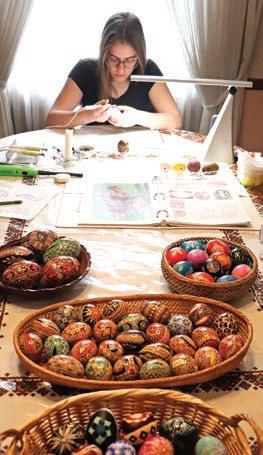
completed in a couple of hours.
“The patterns are standard patterns from the old days. Like triangles, crosses, stars, fish, wheat, animals, waves and dots. Typically, you have repeating patterns like a band that goes around the egg.”
Adding that the symbols were pagan to begin with, Glovatsky says “as Christianity came about all the symbols took on different meanings.” Besides having a passion for the craft of pysanky, he has also taken the time to trace the tradition’s history. He references a 1972 National Geographic article he has on hand that details the symbols’ meanings further: a fish represents Christianity, a triangle symbolizes the Holy Trinity, a cross signifies the resurrection of Jesus Christ.
The dye colors also have meaning, he says. “Yellow for the sun, green for earth and grass, red for life-giving blood, prosperity or health, blues for the skies, purples for royalty. Black is unique, it symbolizes that the other side of life is death.”

end,” says Glovatsky. “I like to blow them out so they dry properly. If you don’t blow them out, they will dry out naturally and you can hear the yolk inside them.”
Glovatsky says his detailed eggs can take six hours or more to make, while simpler ones can be
“The dyes we use today are typically aniline, but in the old country they used colors from beets, leaves, onions, berries and tree bark to get the basic colors.”
Continued on page 16
The Rock | 15
Continued from page 15
A PUBLIC DISPLAY
A visit to the Glovatsky home is evidence of his passion for his culture’s tradition. There are many cabinets filled with decorated eggs.
Sometimes he is asked by others who admire the beauty of
the eggs whether they can buy some.
“I don't sell them as it is more an act of sharing this unique perpetuation of history and its beauty to others, to give them a unique item to talk about and enjoy.”
Recently, though, he had an idea to share them with the community through a display at the Plymouth District Library during February.


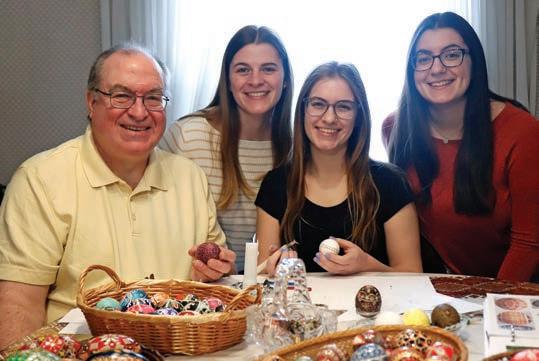




















“I saw over the years that the library always rotates and puts different things in the display case. I saw Christmas pins, military medals, for example,” he said. “It hit me that it would be interesting to display Ukrainian eggs. I asked the library if they would be interested. And they said they had an empty month. With the Ukrainian war going on, I thought it would be interesting for people to see the exhibit.”
The exhibit was compiled from a large supply of eggs that
he has made over the years, with a few from his now college-age daughters Rachel, Sarah and Katie.
“Usually, you keep a pile of eggs for reference in your own home. It’s like a good omen for health and prosperity.”
Good omens, enjoyment of an ancient craft, their history and their sheer beauty – they all play a part in Glovatsky’s commitment and practice of the art of pysanky, which is sure to continue his family’s tradition for generations to come.




OFFER ENDS SOON, CHOOSE FROM -OR$500 OFF 18 MONTHS INTEREST FREE* Not valid with any other offer. UP TO Expires 4/30/24 248.399.2311 furnitureprofiles.com TURNING THE ORDINARY INTO THE EXTRAORDINARY Fine Custom Cabinets... at Prices You Won’t Believe! Home Offi ces • Libraries • Book Shelves • Built-in/Free Standing Fireplace Walls Entertainment Centers • Window Seats • Mud Rooms 248.284.4448 furnitureprofiles.com Call Today for a FREE Design Consultation CUSTOM MADE CABINET SOLUTIONS LOCAL FACTORY DIRECT PRICING! Up to $500 OFF - orTURNING THE ORDINARY INTO THE EXTRAORDINARY Fine Custom Cabinets... at Prices You Won’t Believe! Home Offi ces • Libraries • Book Shelves • Built-in/Free Standing Fireplace Walls Entertainment Centers • Window Seats • Mud Rooms 248.284.4448 furnitureprofiles.com Call Today for a FREE Design Consultation CUSTOM MADE CABINET SOLUTIONS LOCAL FACTORY DIRECT PRICING! Up to $500 OFF - orTURNING THE ORDINARY INTO THE EXTRAORDINARY Fine Custom Cabinets... at Prices You Won’t Believe! Home Offi ces • Libraries • Book Shelves • Built-in/Free Standing Fireplace Walls Entertainment Centers • Window Seats • Mud Rooms Call Today for a FREE Design Consultation CUSTOM MADE CABINET SOLUTIONS LOCAL FACTORY DIRECT PRICING! Up to $500 OFF - or - 0997-0823DT OFFER ENDS SOON, CHOOSE FROM *For qualify buyers. $5000 minimum order required. Some restrictions apply. Not valid with any other offer. Expires 10/31/23. Up to $500 OFF 18 MONTHS INTEREST FREE* - orTURNING THE ORDINARY INTO THE EXTRAORDINARY Fine Custom Cabinets... at Prices You Won’t Believe! Home Offi ces • Libraries • Book Shelves • Built-in/Free Standing Fireplace Walls Entertainment Centers • Window Seats • Mud Rooms 248.284.4448 furnitureprofiles.com Call Today for a FREE Design Consultation CUSTOM MADE CABINET SOLUTIONS LOCAL FACTORY DIRECT PRICING! TURNING THE ORDINARY INTO THE EXTRAORDINARY Fine Custom Cabinets… at Prices You Won’t Believe! CUSTOM MADE CABINET SOLUTIONS LOCAL FACTORY DIRECT PRICING! CUSTOM MADE CABINET SOLUTIONS LOCAL FACTORY DIRECT PRICING! Home Offices • Libraries • Book Shelves • Built-in/Free Standing • Fireplace Walls Entertainment Centers • Window Seats • Mud Rooms 0997-0823DT OFFER ENDS SOON, CHOOSE FROM *For qualify buyers. $5000 minimum order required. Some restrictions apply. Not valid with any other offer. Expires 10/31/23. Up to $500 OFF 18 MONTHS INTEREST FREE* - orTURNING THE ORDINARY INTO THE EXTRAORDINARY Fine Custom Cabinets... at Prices You Won’t Believe! Home Offices • Libraries • Book Shelves • Built-in/Free Standing Fireplace Walls Entertainment Centers • Window Seats • Mud Rooms 248.284.4448 furnitureprofiles.com Call Today for a FREE Design Consultation CUSTOM MADE CABINET SOLUTIONS LOCAL FACTORY DIRECT PRICING!









734 | 344 | 5588 certapro.com/plymouth-mi Each CertaPro Painters® business is independently owned and operated. Lic# 2101207045 9357 General Dr., Suite #123, Plymouth, MI 48170 Professional painting. Transparent estimates. Reliable communication. That’s CertaPro Painters® of Plymouth. 10 Years of Serving Our Neighborhood •Water Filtration •System Upgrades & More! Your Local Full Service Sewer & Drain Experts. 734.619.0880 •Emergency Plumbing Services •Drain Cleaning & Maintenance •Pipe Coating & Lining Services we offer: VISIT US ONLINE All Professional. Zero Hassle. A to Z.™ Must mention coupon upon service request. Restrictions may apply. $99 DRAIN INSPECTION 10% OFF BACKUP SUMP PUMP $100 OFF 10% OFF PIPE PATCH or SEWER LINING • Emergency Plumbing Services • Drain Cleaning & Maintenance • Pipe Cleaning & Lining • Water Heaters: Tankless & Standard • Sump Pumps Water Backup 833.STOP.WATER TRENCHLESS REPAIR BEFORE 833.STOP.WATER TRENCHLESS REPAIR BEFORE AFTER Don’t Dig it, Epoxy Line It! FREE CAMERA INSPECTION Z Plumberz is amazing. Diagnosed an issue that others couldn’t. At the house same day we called. Explained the issue in terms I could understand. One company wanted to charge us $50,000 for a brand new sewer line. Pete and team went over the new sewer lining technology they have and it was only going to cost a fraction of the others. The job is now done and we won’t have issues for a century. They are total pros! BEFORE AFTER



STRUTTIN' HIS STUFF
Like his ancestors, 'Gerry' the Plymouth turkey has had his ups and downs
By Scott Spielman
Nobody knows exactly when the Plymouth turkey came to town or where he came from, but he may be here to stay.
“It’s an emerging issue for us,” said Adam Bump, an upland game bird specialist with the Wildlife Division of the Michigan Department of Natural Resources. “We’re trying to come up with some strategies and divert some resources to finding better answers for people who have urban turkey situations. It’s something we’re trying to figure out. It’s a relatively new problem that’s becoming more frequent.”
Meanwhile, “Gerry,” as some locals have named him, has taken up a sort of residence near Ann Arbor Road and Main Street, a busy intersection where he frequently blocks traffic, struts among the vehicles, pecks at tires and an occasional pedestrian or wanders through nearby
neighborhoods. He’s become a minor local celebrity, complete with his own Facebook page.
He’s also caused a minor headache for city officials.
“Oh, we’ve had plenty of calls,” City Manager Paul Sincock said with a smile.
“My advice is to stop feeding him. Please don’t feed the wild animals. We like to keep them in the wild.”
A reliable food source is most likely what drew him to the community to begin with, said Bump.
“I can only speculate on what he’s doing. It’s hard to get inside a bird’s head and know what’s going on,” Bump chuckled. “But they realize these urban centers can provide them everything they need. There are food resources there, there’s oftentimes bird feeders they have access to—sometimes people will deliberately feed the
turkeys, they’re targeting feeding the turkeys.”
A BRIEF, FOWL HISTORY
Gerry is an Eastern Wild Turkey, a variety of wild turkey now found throughout the Midwest. The Eastern Wilds have had an up-and-down history in the state of Michigan. They predated the European settlers who came to the state in the 1800s. Through unregulated market hunting and habitat loss from timber harvest and residential expansion, they disappeared from the state around 1900. Attempts to reintroduce the bird to the state were not successful until the late 1940s or early 1950s.
“We had a bunch of failed attempts to reintroduce them,” said Bump. “When they finally took off, they took off. After we got them established, they started going into new places. They did better than early
wildlife specialists thought they would do.
“Now we have them in every county in Michigan—and they’re actually in places where they probably weren’t prior to European settlement,” he added. “What we’ve seen increase of over the last 20 years or so is an increase in what I’ll refer to as urban turkey.”
WHY PLYMOUTH?
Bump said it’s not uncommon for wild turkeys to visit urban areas—particularly if, as he suspects is the case with Gerry, there is a reliable food source nearby. They don’t require much space; a simple backyard with a nice-sized tree will do it. They are frequently seen in neighborhoods throughout the state, in all types of settings.
It's somewhat unusual, however, for one to pick a busy spot and stay there so long. They are not domesticated and
18 | The Rock
“An individual turkey doing this on its own—it’s hard to explain. Upland game birds occasionally just do weird things. It’s just changed its normal, wild behavior and decided to act somewhat domesticated.”
Adam Bump, an upland game bird specialist with the Michigan DNR’s Wildlife Division
eventually shun human activity.
“I think what happens over time is they just get very used to human activity. They spent their whole life there, and maybe their parents spent their whole life there,” he said. “It’s just what they know. They just adapt to those circumstances.
“An individual turkey doing this on its own—it’s hard to explain,” he added. “Upland game birds occasionally just do weird things. It’s just changed its normal, wild behavior and decided to act somewhat domesticated.”
Gerry’s apparent fearlessness regarding the thousands of pickup trucks, SUVs, motorcycles and other vehicles that frequent his adopted habitat is easier to explain, however.

Many wild birds habitually stand near busy highways, heedless of the traffic speeding by. It’s one way they defend their territory.
“I think they think they’re tougher than anything. Normally at any time of the year they would run into a ditch and hide,” Bump said.
That type of behavior is more pronounced during breeding season, he said, which is another potential reason Gerry came

to town. In the wild, turkeys are attracted to sounds from things like chainsaws and 4x4s. The birds emit a low thumping sound during breeding season that could be similar to the bass pumping out of a street rod.
During that time, they’ll get more aggressive with defending their habitat—adopted or not. He said that’s why Gerry might be pecking at tires or blocking vehicles.
“Most likely, it’s trying to get that vehicle out of an area that it has decided is his," he said. “Or maybe he’s seen his reflection in the mirror, thinks it’s another tom and wants it to go away because it’s in his space. Usually, what eventually happens is they make a mistake and a car hits them, or they eventually come to their senses, but this bird has made it longer.”
GERRY GETS CLIPPED
Unfortunately, that’s what happened to Gerry at the end of February. He got too close to a
passing vehicle, was clipped and injured his leg. There are varying accounts of what happened after. Some of his Facebook followers said he was transported to the Howell Nature Center to heal up and be reintroduced to the wild. A spokesperson there refuted that, however, saying that they had heard about Gerry’s story, but he had not been treated at the clinic.
Others said he got away on his own—despite attempts to catch him—and, although limping, is still around town. One resident said he saw the bird roosting in a tall tree on Harvey Street.
That is possible, Bump said. Turkeys are primarily land animals, but they are capable of flight, even reaching heights of 60 or 70 feet. They’re also a lot quicker they one would expect, even when on the ground.
“They have pretty good flight capabilities. They’re not going to go long, long distances, but they can fly when they need to,” he said.
Sincock said city officials have been working diligently with state agencies to try to find a new home for the bird, who has since been seen limping around the nearby neighborhoods, injured leg tucked against his belly. That’s not as easy as it sounds.
“Relocation is often more traumatic. You’re sticking it somewhere it’s not used to being,” Bump said. “You’re sticking it somewhere where there might be other turkeys that don’t want it there. If it’s used to people and used to getting food from people, almost certainly if you move it it’s going to try to find a similar situation.
You’re just moving the problem somewhere else. It becomes a challenge.”
It’s a challenge that the MDNR and other agencies are taking more seriously, as our own habitats are expanding and encroaching on the forests, fields, lakes and streams that make Michigan one of the most scenic locations in the U.S.
“We’ve been looking at options,” Bump said. “Finding a solution that is satisfactory for all sides is pretty challenging.”
In the meantime, he said he agrees with Sincock: don’t approach the bird or try to catch him and limit the available resources that might keep him around.

“Usually what we do is encourage people not to feed it so that maybe, if the main reason it’s in that spot is because it has a readily available food source, if you stop feeding it, then it might choose to go somewhere else on its own,” he said. “There isn’t a way to just make it stop. If you stop feeding it, it’ll probably go somewhere on its own.”
The Rock | 19
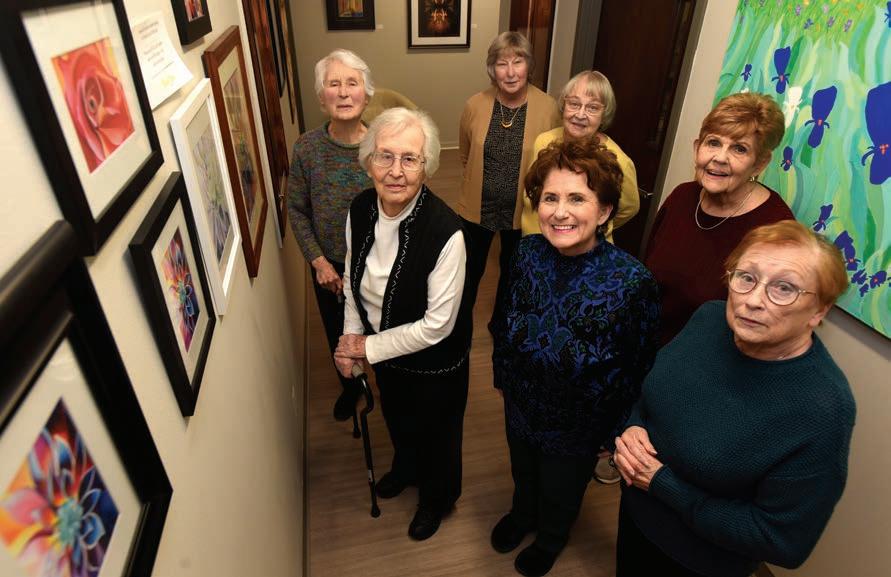
Staying Power
Plymouth Study Group begins its 73rd year
By Michele M. Fecht | Photos by John Heider
In 1951, five former teachers gathered one morning each week in each other’s homes to share the friendship and camaraderie they had enjoyed in their work. While they missed teaching, their primary purpose was the social interaction. By the year’s end, five additional former teachers joined the group, and by 1952, the group numbered 15 and tasked itself with a list of subjects to study.
That was the beginning of the Wednesday Morning Study Group, now the Plymouth Study Group, which kicks off its 73rd year next month with the opening of its Spring 2024 Lecture Series. The study group offers six programs in the spring and another six in the fall. The myriad of lecture topics ranges from current events to history, art, travel and more.
Elizabeth Barker, a 24-year study group member and its current program co-chair, said
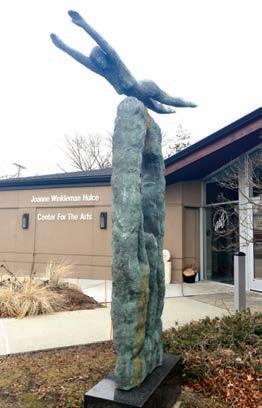

the organization’s staying power is rooted in its founding mission of engagement and study.
An article in the November 20,1966 issue of the Plymouth Mail captured that sentiment.
“How do you create a successful study group that has
the 21st century. The Plymouth Women’s Club debuted in March 1893 but disbanded in 2004 due to declining membership.
While the Plymouth Study Group’s membership started as an all-female organization, Barker said men are welcome to join. The group’s membership now numbers about 75. The Spring Series begins April 11 and concludes May 16. Cost for the series is $25. The group does not meet if the Plymouth-Canton Schools are closed due to weather conditions.
Those interested in more information may contact Elizabeth Barker at (734) 386-9905.
won nationwide recognition in its 15 years of existence? Simply have outstanding speakers and enthusiastic members. More than 50 members gather at the Dunning-Hough Library Thursday mornings to hear speakers from the universities in the area. Once known as the Wednesday Morning Study Group, the name was recently changed to the Plymouth Study Group. This eliminated a lot of jokes about the Wednesday group that meets on Thursday.”
The group continues to meet on Thursdays from 10 a.m. to noon but changed its venue to the Plymouth Community Arts Council on North Sheldon Road as its attendance numbers increased.
The Plymouth Study Group’s purpose is like that of women’s clubs formed in the late 19th century. While many survive today, the popularity of women’s club’s waned as they entered

SPRING SERIES
APRIL 11
Irish folk singer, Enda Reilly, will share songs and stories of his homeland.
APRIL 18
Ryan Mack, a local lavender grower, will discuss lavender’s many benefits and his family’s lavender farm.
APRIL 25
Greg Donofrio, co-owner of Critical Mass LLC and the Phoenix Mill, will discuss the renovation of the 1922 Henry Ford village industry plant.
MAY 2
Jody Coebly will discuss the Titanic’s fateful voyage and tragic history, which took the lives of 1,500 passengers.
MAY 9
To be determined.
MAY 16
Ed Blondin will discuss how American gardens have been influenced by the ancient gardens of the Persian Empire.
20 | The Rock
Peek Inside Your Health: Full Body MRI Screenings Unveil Silent Issues Before Symptoms Arise
(SOUTHFIELD, MI) Full body MRI clinics have gained national attention lately, as TV personalities publicly share their personal full body scan experiences. One actress credits the scan for saving her life after doctors dismissed her unexplained pain for months. After various tests, including a CT scan, had “unremarkable” results, the pregnant actress became her own advocate, searched out a full body MRI clinic and discovered she had pancreatic cancer. Thanks to early detection the tumor was removed successfully.
As a general rule, when symptoms occur related to cancer, it usually has progressed to stage three or four. Even with annual physicals, there are limitations. Most screenings only cover about 29% of cancers with 71%
occurring outside of where doctors are able to screen. However, full body MRI scans can detect cancer in every organ from the top of the head through the genitals and can detect it very early.
For a long time, full body MRI scans were available only in select areas outside of Michigan, requiring expensive flights like in Vancouver or California. However, this changed when a clinic opened in Southfield, making these scans available to Metro Detroit residents.
“Our advanced MRI screening can detect cancers very early when they are as small as a pencil eraser and are more easily treatable. If cancer goes undetected, however, it can grow into stage three or stage four with difficult treatments. We can

also identify conditions such as brain, abdominal, chest, and groin aneurysms,” stated the founder of the Southfield clinic called Bionicc Body Screening.
The primary focus of Bionicc Body Screening is to deliver peace of mind, offering a comprehensive and detailed imaging of the body’s internal structures. The ultimate hope is for excellent health. However, in the event that something is detected, the advanced screening aims to catch any potential issues at their earliest stages. This approach offers the best opportunity for successful treatment outcomes, should the need arise.
Robert B., age 50, opted for a full body scan from Bionicc Body Screening and a very small tumor

was detected. He said, “It saved my life. Their MRI found a kidney tumor that had been missed by a recent CT scan. I cannot recommend this service more.”
Take the first step to learn more about full body scans by visiting www.BioniccBodyScreening. com and request a free, no obligation Information Kit. Request it today and you’re also guaranteed a copy of their FREE eBook, Catching Cancer Before It’s Too Late! (This is a limited time offer.) Schedule today at 1-833-BIONICC.


SPECIAL ADVERTISING MESSAGE Help us keep Plymouth leafy! Scan to get a free street tree for your City of Plymouth property from Keep Plymouth Leafy! www.KeepPlymouthLeafy.org IG & FB: @KeepPlymouthLeafy Keep Plymouth Leafy is a 501(c)(3) non-profit organization


NATIONAL BLUE RIBBON SCHOOL
Gallimore Elementary riding high with national, state honors
By Tim Smith
Life and learning comes at Gallimore Elementary School students pretty fast, but that’s just the way they like it.
Evidence is pretty strong they can easily handle it, too.
After all, the Gallimorehoused Talented and Gifted Program for students in grades 3-5 has garnered national recognition as one of the United States’ top-performing schools – why wouldn’t especially motivated and eager-to-learn youngsters want to be there?
Consider parent Nancy Yeung, who currently has a son in Gallimore’s TAG program and
twin daughters who spent three years there before moving on to sixth grade for 2023-24. The twins now are at East Middle School, where TAG learning continues on a part-time basis.
“I asked my kids to give me a quick statement about Gallimore,” noted Yeung in an e-mail. “Clara said ‘Gallimore has awesome teachers!’ Sarah said ‘Gallimore has great students!”
Gallimore third grader Nelson, meanwhile, chimed in that he likes how his teacher “gives us challenging work outside of the curriculum.”
The school being awarded national honors totally bears
While her children love the TAG program, Nancy Yeung said she has high regard for it as well.
“It is a well-designed program that can help advanced students thrive in a fast-paced learning environment,” Yeung said. “It is more like an opportunity for my kids, who are able to learn at a fast pace, to enrich their learning.”
She underscored how the program challenges and enriches the total child, with academics only part of the picture. Extracurricular activities such as chess club and robotics keep the pace moving. And teachers keep classroom lessons fresh and innovative by not constantly sticking to the script.
“My kids fit into the non-TAG school just like any other kids, but felt certain core subjects were slow and redundant,” Yeung stressed. “After entering the TAG program, they had the opportunity to challenge themselves further.”
Catalyzing young minds to reach for the heights is how Gallimore principal Aimee Bell described the program.
that out. Gallimore, which is located on Sheldon Road near Joy, recently was ranked as Michigan’s No. 1 elementary school for 202324 in a national survey by U.S. News and World Report.
According to the magazine, all of Gallimore’s students scored at or above the level of proficiency in math and reading – the only Michigan elementary school to reach that level.
And that announcement followed its prestigious designation as a 2023 National Blue Ribbon School. Gallimore previously won the award in 2017, and last year was one of 11 Michigan “Blue Ribbon” public schools.
“Gifted learners really need the right catalyst. That’s why this program is a good place for some kids, because they need to keep fueling,” Bell said. “They have this innate ability, possibly, but then it has to have the right catalyst to continue to grow and foster.
“Two (catalysts) I see in our classrooms all the time is really helping kids understand the ‘why’ behind things. In math, it’s not just getting the right answer but helping them grow to where they can explain their understanding and really own the process.”
For Gallimore TAG teachers like Kristi Berry, it’s all about sparking robust classroom debate.
“I think they all have insatiable curiosity, that’s why I love teaching here,” said Berry, who teaches fifth grade.
22 | The Rock
“They wonder a lot, they notice intricacies. They question history. They question science.
“Their curiosities drive a lot of our lessons. So that’s part of why we make so much success here. We let the kids explore and we let their questions sort of drive our instruction.”
Gallimore’s TAG program has more than 300 students, who were selected from the district’s other 13 elementary schools after completing the NWEA (Northwest Evaluation Association) Measures of Academic Progress screening test while in second grade.
Bell, Gallimore’s principal for a decade, said enrolling students with demonstrated academic potential is one reason for TAG’s continuing success and rapid growth. (When TAG began at

Miller Elementary School in 1977, there were 25 students.)
“It is important to us, that’s why our process has been refined over the years,” Bell explained, “to make sure we’re not just including students who are nominated by their parents, but that we’re screening all students. That’s where NWEA helps, so any students who meet the threshold are communicated with” as being prime candidates for Gallimore’s TAG program.
But don’t think for a moment that these elementary school students aren’t regular kids when they want to be.
“They’re eight, nine, 10- or 11-year-old kids,” Bell said.
“I have to remind people that ‘They’re eight.’ So, yeah, maybe a student can do some high-level math but they’re also eight and they want to play outside, play basketball. Or draw and color.”
While Bell was talking about the program inside a Gallimore conference room, a loud cheer broke out elsewhere in the office. She said it was another example of Roadrunner Recognition.
“That’s one way we support social and emotional learning, making sure small things are celebrated in a big way,” Bell noted. “That’s what that (cheer) was for. It can be academic, but it’s also recognizing the small things that we do that we don’t usually recognize, like holding the door for someone.
“Or contributing in a group when you’ve been really quiet. It can be finishing an assignment when you haven’t done that lately.”
Students have their pictures taken and placed on a wall to trumpet those relatively minor triumphs.
But given the National Blue Ribbon and U.S. News and World Report honors, there are plenty of bigger wins to celebrate – and not only at Gallimore, but also for Plymouth-Canton Schools.
“I think it’s a feather in the cap for the entire district,” stressed Berry. “The accolades have gone to Gallimore. But really, it says a lot about how the children were prepared at all the elementary schools in the district.”
Yeung certainly treasures what the TAG program has meant for her own children.
“I believe that all children in every school are gifted and talented in their own way,” Yeung asserted. “However, as a parent, I am very happy that the TAG program is bringing all likeminded children, who have fast core learning abilities, together.”
People in important places are noticing.
TAG founder thrilled about Gallimore honors
Imagine successfully jumpstarting something with the potential to be special, but then leaving it behind to chase other pursuits for more than 45 years.
Now imagine finding out decades later that the late 1970s “idea,” to launch a Talented and Gifted Program in PlymouthCanton Community Schools, has been bestowed with the highest of honors in the educational world?
Jaw hits floor is how Rick Olenchak described his reaction.
“I was without words, I was shocked,” said Olenchak about finding out Gallimore was designated as a National Blue Ribbon school and is ranked by U.S. News and World Report as Michigan’s top elementary school for 2023-24.
Olenchak said he couldn’t believe that the TAG concept he launched in 1977 at P-CCS’s Miller Elementary School – on a much smaller scale than the 10-star program of today – is going stronger and is more acclaimed than he ever could have predicted back then.
“When you launch something, you never know whether it’s going to take, right?” said Olenchak, who today still champions the best and brightest at Purdue University in West Lafayette, Indiana. He is a professor in the Gifted, Creative and Talented department.
In 1977, P-CCS sought an educator with a penchant for thinking outside the box and Olenchak, having finished postgraduate work at the University of Arizona (he did his undergraduate work at the University of Michigan in Ann Arbor), answered the bell.
“I envisioned each school having a school-based program

as opposed to the program being centered at one school,” he recalled during a recent telephone interview. “I think the economy of scale ultimately caught up as it has with most everything in life. And I think over the years it evolved to being situated at a single elementary school.”
What then was experimental now is a district staple. Gallimore today has over 300 students in grades 3-5 who are high academic achievers and creative thinkers.
Olenchak spent several years in the P-CCS district before taking a teaching job in Howell Public Schools where he became a principal. He later moved to various bastions of higher education, including the University of Houston and University of Alabama. A long list of impressive credentials include serving as President of the National Association for Gifted Children, to name just one.
Olenchak now lives in Carmel, Indiana, about an hour’s drive from the Purdue campus.
But he has always kept tabs on Plymouth-Canton, and he maintains friendships from those formative years.
“My sense of PlymouthCanton, from the get-go, is that it was a population of people who valued learning, valued knowledge, valued that for their kids,” said Olenchak. “They wanted their children to flourish and they wanted them to flourish in a way that their futures would be grounded in knowledge.”
That mindset continues in 2024 as it did in 1977, something which undoubtedly brings Rick Olenchak a mix of pride and happiness.

The Rock | 23
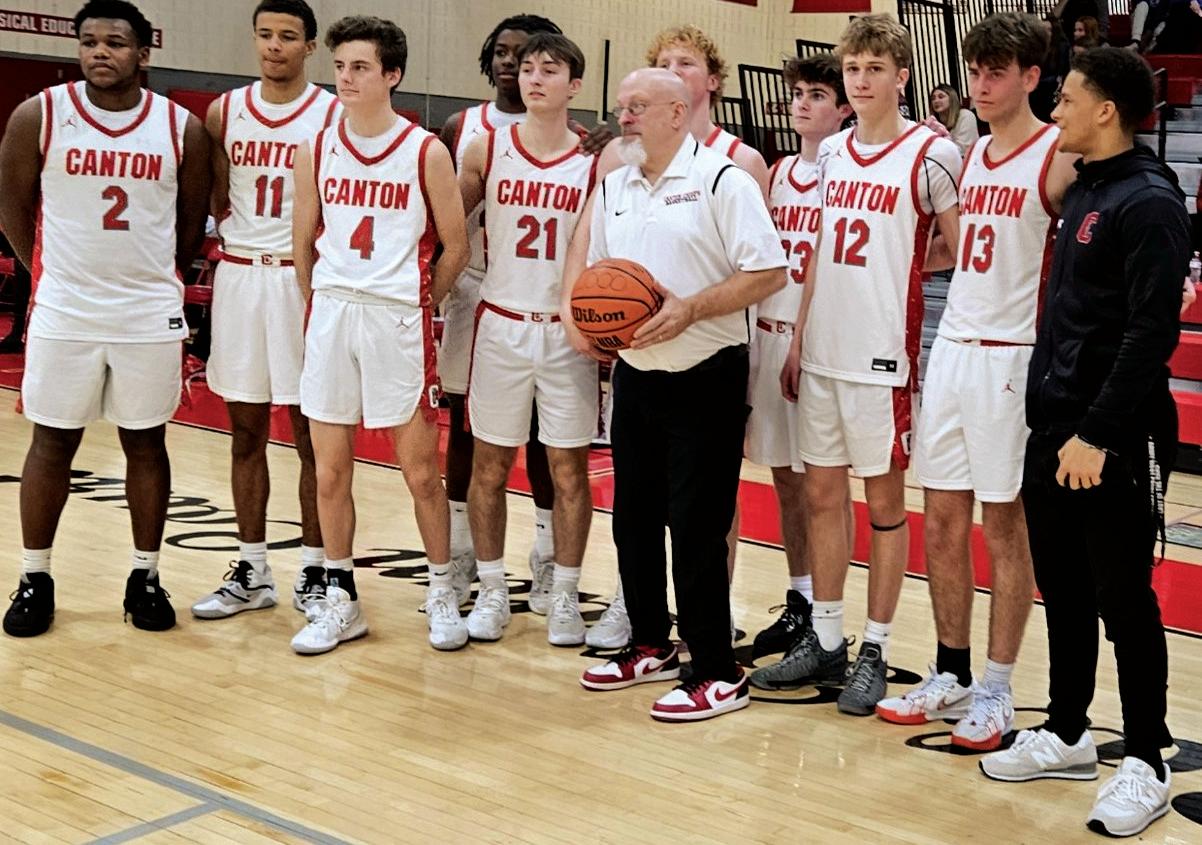
There’s no doubting that Scott Thomas has proven to be an inspiration that goes well beyond his loyalty, devotion and contributions to the Canton High basketball program.
Born with cerebral palsy, the 1991 Salem High grad and teacher at Plymouth High has been the girls and boys scorekeeper since 2000. He’s been a fixture ever since.
With the help of research done by Canton super fan and P.A. announcer Robert Mitchell, Thomas hit a landmark on Jan. 24 at Hartland when he scored his 2,000th game. And on the next night during a home game against Salem, Canton coach Jimmy Reddy and his team presented Thomas with the game ball in recognition for his efforts over the past 24 years.
“We figured out last year where we were at, then added it up from there,” Thomas said of the 2,000-game milestone, which also included scoring freshman and JV games. “I couldn’t do it with a better staff. I work with some legends – Bob Blohm, Brian Samulski, Jimmy Reddy –

if it wasn’t for them, I wouldn’t be able to do what I do. They’ve been fantastic and they’re all phenomenal coaches. I’ve been pretty lucky. I worked with Jeremy Rheault, Charlie Paye and Dan Colligan as well. Good group of people.”
It was the third game of the 2000 fall Canton girls basketball season when Thomas got the call from Blohm while he was the varsity coach.
“I remember the guy doing the book got the team a technical and Bob was pissed,” Thomas recalled. “I used to sit on the bench. That night, after the game, Bob’s like: ‘Thomas, you’re on book,’ and I had never done the book in my life. I had no idea what I was doing. So, the next game I was doing it and have been on it ever since. I had never done scorebook for any sport…but there I was.”
Rheault also asked him to do the boys scorebook and he started that same year. But when the Michigan High School Athletic Association girls and boys hoop seasons began to coincide during the 2007-08 school year, Thomas had to make a choice.
By that time, Samulski
had taken over for Blohm, who stepped down to become Samulski’s assistant.
Thomas remained with the girls up until 2018-19 season, occasionally doing boys games if called upon and it didn’t conflict with the girls schedule. But since that switch, he has occasionally filled in to do the girls games under current Canton varsity coach Kayla Bridges.
‘FOND MEMORIES’
Thomas has nothing but fond memories during his nearly 18year stint with the Canton girls, starting with a matchup against Salem Hall of Fame coach Fred Thomann.
“Salem was ranked in the top 10 and we were supposed to get hammered according to Mick McCabe (of the Detroit Free Press) in his predictions,” Thomas recalled. “Salem was up by two at half and they only scored four points in the second half. We came out and dominated them and it was awesome.”
And then there were the experiences where the Canton girls made three different runs to Michigan State’s Breslin Center
in 2010, 2011 and 2014 under Samulski, who is now the athletic director at Northville High.
“Just those experiences –where I’m actually taking the scorebook to the Final Four,” Thomas said. “That was surreal to me. I wish I had taken more pictures and all that kind of stuff to remember all that. Those teams in 2010 and 2011 were unreal--not just because they were good, but those girls were just like a family. And I’ll never see a team like that again. It was unreal and I didn’t know how to explain it. It was a close-knit group of girls that did everything together, and they battled together. Those two teams I’ll remember the most.”
When Thomas transitioned over to the boys, he also gained some great memories.
“Jake Vickers, a number of years ago, hit the game-winning shot at Plymouth,” Thomas said. “He was going out-of-bounds, it was like an unreal shot. That was a game I’ll never forget. Omar Suleiman, last year, hit a halfcourt shot against Salem to win.
“And the boys this year –what they did for me – with the 2000th game. They came by my room,” he continued, “those are the things you remember. Twothousand games are a lot.”
OVERCOMING CHALLENGES
Scott Thomas has also endured a lot during his life.
One of three children of Roland Jr. and Mary Thomas, Scott was born with cerebral palsy, a group of movement disorders that appear in early childhood caused by damage that occurs to the developing brain, most often during birth. It’s a group of disorders that affect a person’s ability to move and maintain balance and posture.
Scott, who has a twin brother J.T., and an older sister Traci, a 1989 Salem grad, certainly had his challenges growing up, but always found a way to navigate.
24 | The Rock
“Because of the way my parents raised me, I never viewed myself as someone with a disability just because my parents made me do things that I didn’t think I could do,” Thomas said. “Their mindset helped shape me to what I am today. I was like my brother and sister. They didn’t treat me any different.”
Roland Thomas, along with Al Flowers, were mainstays for years in running the PlymouthCanton Junior Basketball Association. Roland coached J.T. from the second grade all the way up to high school in the PCJBA, while Mary would attend games and drive the three siblings to practices.
“I cheered on all my friends at Salem sporting events,” Scott said. “I was the number one fan of my older sister (Traci) who ran
Education. After student teaching in 1997, Thomas began fulltime with the Plymouth-Canton Schools in August of 2000.
He currently teaches honors debate, interpersonal communications and American literature at Plymouth High.
In 2007, Thomas was rushed to the hospital after collapsing at his home. His then fiancé, now wife Kelly, made the call to 911. He was transported to St. Joseph-Mercy Hospital where he struggled for life.
“My heart was failing and running less than two percent,” Thomas said. “My liver was failing and one of my kidneys was failing and St. Joe’s didn’t know what to do.”
With his parents’ permission, Thomas was sent to the University of Michigan Hospital where he

track and cross country for Salem, and then my twin brother (J.T.), who played basketball, ran track and cross country for Salem.”
But once the American Disabilities Act had gone into effect in 1990, Scott was allowed to play in the PCJBA during his senior year at Salem.
Following his graduation from Salem, Thomas embarked on a teaching career first attending Lake Superior State (“Where I flunked out”) and Schoolcraft College before earning a degree in Communications/English from Wayne State’s College of
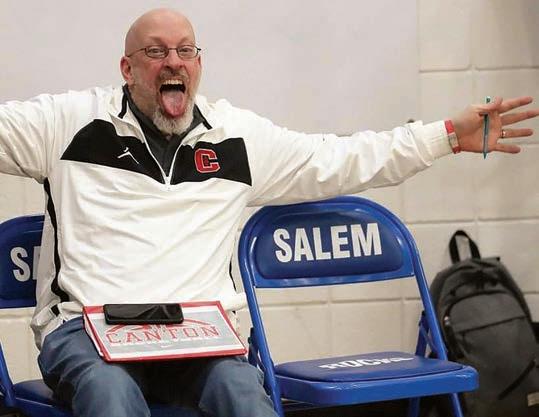
able to figure out, by process of elimination, that Thomas had adult onset Still Disease, a rare type of inflammatory arthritis where common symptoms include fever, rash and joint pain.
And after 14 days in an induced coma, Thomas finally was able to return home.
“I have what is considered chronic Still Disease where I have symptoms that come back on a pretty regular basis,” Thomas said. “I will get the rash on certain parts of my body. Throughout the year I can tell my temperature when it’s lower than normal and it can go higher. When I get a flareup I get a burning sensation several times a month. I have chronic joint pain because of the rheumatoid arthritis that has set in because of the Still Disease.”
daily basis.
“It’s a whole host of things,” he said. “I wear a medical bracelet, because if the Still Disease comes back full-fledged again, it will kill me. I’m on medicine that helps control some of the symptoms now and again, and I take a shot every single day that I’ve been on since February of 2007.”
Thomas and his wife Kelly, a Canton High grad, live in Westland. They have one son Matthew, 11, who plays basketball and also plays football for the Livonia Orioles.
There’s no doubt that Canton basketball will always be a part of Scott Thomas’ family as well. All you have to do is look down at the scorer’s table for all the Chiefs’ home and away games.
was put in an induced coma.
“They didn’t know what was wrong with me,” Thomas said. “They inserted some instruments through me neck and they were able to revive my heart. I was in a coma for almost 14 days, and when I was in the coma my temperature went over 105. I had a rash that was covering my entire body that was like salmon color. My white blood cell count was astronomical, so my body was checked for every type of disease, all different kinds of immune diseases.”
After several days being in a coma, doctors at U-M were
SCARY MOMENT
While working Canton’s 2023 district boys championship game against host Northville, Thomas suddenly suffered an episode where he needed immediate medical attention. He later learned that it was a combination of Still Disease and stress.
“The muscles around my heart were stabbing which makes you think you’re having a heart attack,” Thomas said. “It shows the symptoms of a heart attack.”
Thomas continues to closely monitor his health situation on a
“I knew Scott since he was a student at Salem High School -- and the kid when he was there – loved basketball,” said Blohm, who now serves as Reddy’s assistant with the Canton boys. “His dad was part of the local recreational league, so he kind of grew up with it. He loves it and is just a hard-working, reliable guy. You can depend on at the table.
“I just really think a lot of him. You always know he’s going to do the best job possible that he can do…period. He knows basketball, loves his community and loves his schools. We’re lucky to have him honestly.”


The Rock | 25



100 YEARS OF HISTORY
New book, exhibit tell the story of Plymouth Rotary’s history of service
By Brad Kadrich
Chris Porman has been a member of the Plymouth Rotary Club for more than 15 years, attracted in large measure by the club’s signature event, the annual chicken barbecue.
So when the Plymouth Historical Museum was putting together an exhibit to honor the Plymouth Rotary Club’s 100th anniversary this year, it was only natural for Porman, who now serves as the club’s president, to help put it together.
In fact, Porman and his kids built a replica of the cooking racks Rotarians use to prepare their annual barbecue dinners.
“As a matter of fact, I was the one who built the reenactment of the barbecue,” Porman said. “My kids and I did the ‘arts and crafts’ project, as I call it, to make the fake coals and the flames.”
The replica chicken pit is only a part of the extensive, impressive exhibit the museum has established honoring Plymouth’s oldest service organization – Rotary is about a year older than the Kiwanis Club of Colonial Plymouth, which
turns 100 next year – and takes up the “main drag” hallway on the museum’s upper floor.
The exhibit, which opened Jan. 31 and runs until June 30, contains all manner of memorabilia and artifacts from the club’s history, from a room featuring all the gavels given to club presidents to the barbecue pits to the community farm that existed on the high school grounds.
It’s an exhibit befitting a club that has meant so much to the community.
“They have done incredible community service…they're really tied to the development of Plymouth,” said Elizabeth Kelley Kerstens, the museum’s director. “Rotary participated in making these historical
things that are prominent Plymouth historical features… people have no idea.”
Chartered with 23 members March 6, 1924, the Rotary Club of Plymouth – as Kerstens points out – has been a part of nearly every significant development or event in the city’s history.
As Kerstens and Ellen Elliott, the founder of Save the Penn Theater and a museum volunteer, point out in their book, “Plymouth Rotary Club Chicken Barbeque,” the Rotary Club got started quickly. For instance:
• I n 1924, the club joined the Chamber of Commerce in an effort to help Plymouth’s needy families. Their first fund drive raised $144, according to the book.

n 1927, in cooperation with the Wayne County chapter of the Michigan Society for Crippled Children, the Rotary Club led a survey to determine the needs of crippled children in the area. he Rotary Club played a key role in adding the fountain to downtown Plymouth’s Kellogg Park. There were other groups
involved, as well, but Rotary had a key role.
• Establishment of The Gathering, the shelter along Penniman in downtown Plymouth? The Rotary Club helped build that. “Those are some of the things
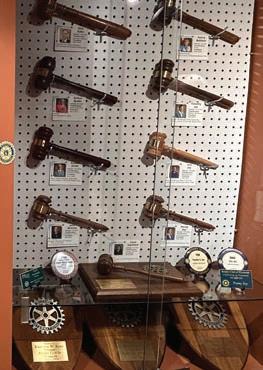
that Rotary has had a hand in over time,” Elliott said. “Most projects that have been really influential, Rotary's had some
26 | The Rock

play in those projects.”
Like the museum exhibit, which takes visitors through every phase of the club’s development, the book authored by Kerstens and Elliott describes the evolution from 23 charter members as Rotary International’s Club 1,677 to the club as it exists now.
Chapter by chapter, the book outlines all the ways the Rotary Club of Plymouth impacts the city it calls home. As one might expect, considerable space is dedicated to the chicken barbecue, which got its start in 1955 as a fundraiser to provide playground equipment at the newly established Hamilton Street Playground.
The event has obviously grown, morphing into the club’s largest, most-visible fundraiser. From those modest beginnings, the barbecue now sees sales of some 10,000 chicken dinners a year, which helps fund Rotary Club activities.
“What the barbecue does and why the barbecue is so important is that's what allows them to fund all of these good things that they do,” Kerstens points out. “So the Rotary Barbecue not only gives us an historical event that we participate in for all these years, but it also provides means for the major funding for them to do their good work.”
(Since 1955, the event has only been scrubbed twice – because of a scheduling conflict in 1959 and the Covid-19 pandemic in 2020.)
It’s all of those kinds of activities that drew Porman into the club. As director of municipal services for the City of Plymouth, Porman often worked in concert with Rotarians on their various projects, including beautification of the islands along Main Street and the chicken barbecue.
Ask Porman why he got involved, and he cracks a joke that his boss, City Manager Paul Sincock, “told me I had to.” Truth
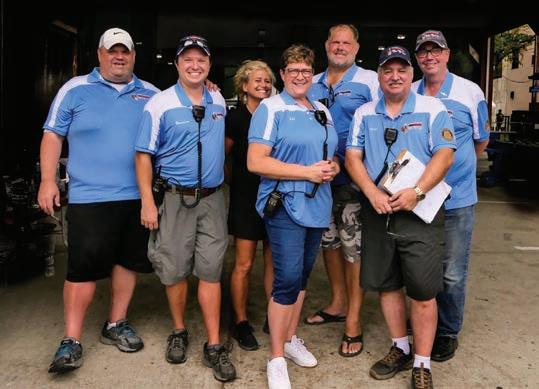
a conversation Kerstens had with Sincock and other leaders a few years ago about compiling a history of the club, anticipating the 100th anniversary.
Eventually the parties arrived at a contract that included compiling a digital history of the club, the museum exhibit and the book.
Kerstens and Elliott, who previously wrote “Plymouth Railroads,” also published by Arcadia, pored over tens of
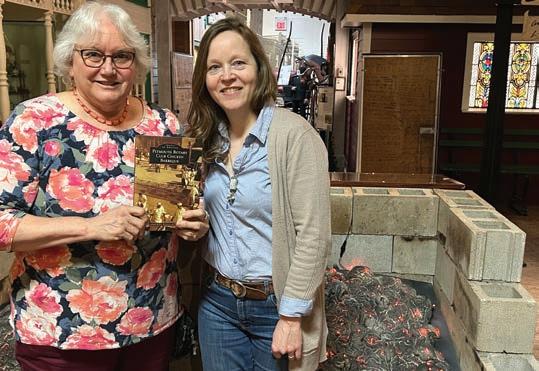
be told, though, to Porman it just seemed like “a natural thing.”
“Those were regular work duties for the city, and I obviously took a liking to it to the point where I said I wanted to be on the other side of it, as well,” Porman said. “I wanted to be a part of the larger Rotary organization, because I enjoyed everything they were involved with.”
The book came about through

thousands of documents and begged, borrowed and cajoled themselves into the exhibit.
The authors point out that readers shouldn’t be fooled by the book’s title. The book also tells the story of the club’s beginnings, talks about the charter members, and programs such as Junior Rotary for high-school kids.
It’s about far more than the chicken barbecue, though it does
spend a couple of chapters on that.
“But then we go in and we talk about their traditions and we talk about who benefits from their work,” Elliott said. “So, it really does, I think, a good job of giving people a really readable way to explore Rotary, explore the influence Rotary has had on this community and the way Rotary works with other groups.”
Porman got what he believes was one of the first copies – “If not the first,” he said – and said it really captures the story.
“It is so much fun to flip through the pages and look at pictures and read the stories that they tell and think back to Rotarians over the last 100 years,” Porman said. “The memories (the book) brings back are just wonderful.
“Plymouth’s ability to bring people together certainly lends itself to what Rotary was all about, service and fellowship,” he added. “The two really go handin-hand and certainly that’s been the case in Rotary’s history with service in Plymouth.”
“Plymouth Rotary Club Chicken Barbeque” is available at the Plymouth Historical Museum store for $24.99. It can also be ordered (as can Kersten’s other books) online through the museum at plymouthhistory. square.site. The book is also available at Arcadia's website www.arcadiapublishing.com.
The Rock | 27

'Voter intimidation' suspect turns himself in
Township
police credit social media, community for quick resolution
By Scott Spielman
The suspect in a potential case of voter intimidation turned himself in to Plymouth Township police on March 7.
Township officials are crediting the widespread sharing of photos and videos of the incident, which took place during the period of early voting at the end of February.
“When you get that kind of widespread, good film of people, they either
cameras on the other side of the drive, Vorva said.
“We thought it was a camera, but it was a solar-powered LED light that was activated by movement. It would flash when you came in front of it,” he said. “They set that up next to the ballot box and then across the drive from the ballot box they put up a fake camera shining down at it.
“If you weren’t paying attention, you would think ‘Oh a camera is
released, but Knittel said he’s cooperating with the investigation.
“The Plymouth Township Police Department is committed to ensuring the safety and integrity of the election process and will thoroughly investigate all possible complaints related to the voting process,” he said.
Unfortunately, incidents like this are increasing, said Township Supervisor Kurt Heise.
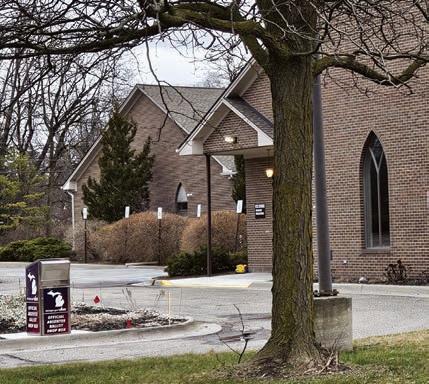
Michigan Department of Investigative Services.
“They are reviewing the incident and investigation,” he said. “I would anticipate that they would contact the Michigan Attorney General's Office for review.”
The incident did not adversely affect the early voting period that led up to the Feb. 27 Presidential Primary, Vorva said. It was a smooth—although expensive—process. He
“This is an unfortunate pattern that has emerged from some township residents and elected officials to deny election outcomes and undermine the integrity of our state’s voting process via social media posts and protests.”
Kurt Heise, Plymouth Township Supervisor
turn themselves in or someone rats them out,” said Township Clerk Jerry Vorva, a former police officer.
The incident took place between Feb. 17 and Feb. 25 at the Risen Christ Lutheran Church on Ann Arbor Road. The church was used as an early voting location.
The suspect, a Plymouth Township resident, installed a device near the ballot box as well as fake
watching me,’” he added. “You might even think the flashing light thing was a camera.”
Township police shared video of the incident and photos of the suspect with the community and area media, said Police Chief James Knittel. He said he was grateful for the vigilance of nearby residents in helping to quickly identify the suspect. The suspect’s name has not been
“This is an unfortunate pattern that has emerged from some township residents and elected officials to deny election outcomes and undermine the integrity of our state’s voting process via social media posts and protests,” he said.
Knittel said the township police department wrapped up their investigation on March 10 and turned it over to the
said the township is still tabulating the final costs associated with renting a place to hold the votes, along with paying for the equipment and training involved. He expects to be reimbursed by the state.
“The system worked out very well. Only 411 people voted, but this was the first time out of the chute. You’ll probably see more participation as this goes on,” Vorva said.
More people voted absentee, which he said was typical.
“That’s not going to change. We have a fairly mature voting population here,” he said, adding that fewer absentee ballots were returned than usual-about 88%, rather than 90%. “Everyone knew who the candidates were going to be. We had about a thousand ballots that didn’t come back.”
There was also one potential case of fraud, which was also turned over to state election officials.
“Almost every election we have one character who thinks they’re going to do something, but it’s not widespread, that’s crazy talk—and there’s a number of them out there, too.”

28 | The Rock



















ONLINE ORDERING or call 734.455.4141 A Downtown Plymouth Favorite Since 2004 www.BurgerSpotPlymouth.com 550 FOREST AVE, PLYMOUTH ( in the WESTCHESTER SQUARE MALL) • 734-455-4141 Monday - Sunday 11 am - 8 pm SCAN QR CODE TO SEE FULL MENU *Price is subject to change without notice. WE CATER EVENTS & GRAD PARTIES Catering@burgerspotplymouth.com Visit our website for exclusive online specials! $500 OFF $30 or MORE CAN NOT BE COMBINED WITH ANY OTHER OFFER OR COUPON. MUST PRESENT COUPON. LIMITED TIME OFFER. ORDER ONLINE USE PROMO CODE: 5OFF30 $300 OFF $15 or MORE CAN NOT BE COMBINED WITH ANY OTHER OFFER OR COUPON. MUST PRESENT COUPON. LIMITED TIME OFFER. ORDER ONLINE USE PROMO CODE: 3OFF15 PIZZA BY THE SLICE AVAILABLE ALL DAY! 437 Forest Ave | Downtown Plymouth | 734-335-7700 *Price is subject to change without notice. Online Ordering Use Promo Code: FAMDEAL Online Ordering Use Promo Code: ONE1TOP Online Ordering Use Promo Code: LG2TOP Online Ordering Use Promo Code: BOGO50 CAN NOT BE COMBINED WITH ANY OTHER OFFER OR COUPON. MUST PRESENT COUPON. CAN NOT BE COMBINED WITH ANY OTHER OFFER OR COUPON. MUST PRESENT COUPON. CAN NOT BE COMBINED WITH ANY OTHER OFFER OR COUPON. MUST PRESENT COUPON. CAN NOT BE COMBINED WITH ANY OTHER OFFER OR COUPON. MUST PRESENT COUPON. FAMILY DEAL 18" LARGE 2-TOPPING PIZZA, 1LB CHICKEN WINGS & CHOICE OF SALAD $ 40 * ONLY 18" LARGE 2-TOPPING PIZZA & CHOICE OF SALAD BUY ONE CALZONE OR STROMBOLI GET THE 2ND (OF EQUAL OR LESSER VALUE) ONE PIZZA WITH ONE TOPPING $ 10 SM 10” $ 13 MED 14” $ 16 LG 18” $27 * 50% OFF ONLY Order Online! pizzaspotplymouth.com Tues-Thur 3-8 pm Fri-Sun 12-8 pm
We believe all your healthcare solutions should live where you do.

Whether you live in Plymouth or nearby, we’re proud to bring world-class specialty care closer to you, including orthopedics, cardiology and neurology. Our facility was built just for you. And it’s just minutes down the road.
Offering the latest orthopedic services at Henry Ford Medical Center –
Plymouth.
Corner of Ann Arbor Road and N. Haggerty | See a full list of services at henryford.com/plymouth PRSRT STD U.S. POSTAGE PAID ST JOSEPH, MI PERMIT NO. 335 *****************ECRWSS**** POSTAL CUSTOMER
Robb Weir, M.D.
Orthopedic surgeon











































































































































